4th Grade Writing Prompts
Hero Images/Getty Images
:max_bytes(150000):strip_icc():format(webp)/squareheadshot-5b6da9aec9e77c0050a6e8a5.jpg)
Students in fourth grade need varied practice developing their writing skills. According to the Common Core State Standards Initiative , fourth-grade writing should include opinion pieces, informative or explanatory texts, and narratives about real or imagined experiences. Additionally, a fourth-grade writing curriculum should include short research projects.
These writing prompts offer diverse forms of inspiration for every student.

Opinion Essay Writing Prompts
In an opinion essay , students must state their opinion and back it up with facts and reasons . Ideas should be organized logically and supported by details.
- Best Friends Forever. Write an essay explaining what makes your best friend the best best friend.
- Awesomeness. Describe the most awesome thing about being in fourth grade.
- New Worlds. Would you rather help start a colony on a new planet or a city under the ocean? Why?
- School Food. Name one thing you would like to change about your school’s menu and explain why.
- Someday. If you could be a race car driver, an astronaut, or president of a country, which would you choose and why?
- Cityscapes . If you had a friend visit from another state, what is the one place in your city you would insist he or she had to see? What makes this place so special?
- Shipwrecked. You find yourself stranded on a deserted island with only three items in your backpack. What would you want those items to be and why?
- Flat Earth. Some people still believe that the Earth is flat . Do you agree or disagree? Include supporting facts.
- Extra! Extra! Name one class, sport, or club you wish your school offered and explain why it should be available.
- Seasons. Which season is your favorite and why?
- One-star . What is the worst book you have ever read and what made it so terrible?
- Fandom. Who is your favorite TV, movie, or music star? What makes him or her the best?
- Progress. Identify a way in which you would like to improve as a student this school year. Explain why you would like to get better and list some steps you can take to make it happen.
Informative Essay Writing Prompts
When writing an informative or explanatory essay, students should introduce the topic clearly, then develop the topic with facts and details. When explaining a process, students should outline the steps in a logical order.
- Bullied. Explain how you would handle being bullied and the steps you would take to stop a bully.
- Mad Skills. Describe an unusual talent, hobby, or skill that you possess.
- Cuisine. Describe a food that is unique to your family or area of the world to someone who has never tasted it.
- Role Model. Think of a person who has made an impact on your life and describe the role they’ve played.
- Pay It Forward. What is one thing you would like to do—either now or in the future—to make the world a better place?
- Packing. Explain the most effective way to pack for a trip to ensure that you have everything you need.
- Wild Kingdom. Of all the animals wild or domesticated, write about your favorite. Include interesting facts about this animal in your essay.
- Gaming. Explain how to play your favorite video or board game to someone who has never played it before.
- Problematic. Describe a problem you’re facing and three ways you could possibly solve it.
- Extreme Weather. Choose an extreme weather condition or a natural disaster such as a tornado or a volcanic eruption. Explain its causes and effects.
- Sweet Treats. Explain the process of making your favorite dessert.
- Learning Styles. Think of the way you prefer to learn, such as by reading, listening, or doing. Explain why you think you learn best that way.
- Edison. Thomas Edison said that he didn’t make mistakes, he just learned 10,000 ways not to make a light bulb. Describe a mistake you made and the lesson you learned from it.
Narrative Essay Writing Prompts
When writing narrative essays about real or imagined experiences, students should use descriptive details and logical sequence. They can use dialogue and sensory details to develop their essay .
- Microscopic Details. Imagine being microscopic. Describe an adventurous trip through your body.
- Alone. You find yourself locked in your favorite store alone overnight. Where are you and what do you do?
- Homeless. A friendly stray dog follows you home from school. What happens next?
- Time Travel. Imagine you could travel back in time to when your mom or dad was your age. Write an essay about your relationship with your fourth-grade parent.
- Mismatched. Write a story about someone your age. The story must include a giraffe, a mouse, a flying carpet, and a large birdcage.
- Pet Peeve. Recount a moment when something really got on your nerves. Describe the experience and why it irritated you so much.
- Surprise! Think of a time your teacher surprised your class. Describe what happened and how the class reacted.
- Special Moments. Think of a specific day or event that you will always remember. What made it so special?
- Travel Through History. Imagine you could travel back in time to live through one event from history . Describe the event and write about your experience.
- The Most Terrible Day. Write an essay about a day when everything went wrong. How did the day start and end, describe the experience.
- Road Trip. Write about a favorite family vacation or road trip. Where did you go? What made it special?
- Funny Pet Tricks. Can your pet do a funny or unusual trick? Describe it.
- President. If you could be president for a day (or the principal of your school), what would you do?
Research Project Essay Writing Prompts
Fourth-grade students should also complete short research projects using books, magazines, and online sources . Students should take notes and provide a list of the sources they used in their research.
- New Puppy. You want a new puppy. Do some research to determine the best breed for your family and write about it.
- Battles . Research and write about what you consider the most significant or famous battle in history.
- Famous People. Choose a famous person from history or science and write about their lives and contributions.
- Animal Kingdom. Select an animal to research. Include facts about its behavior, habitat, and diet.
- Countries. Choose a country. Investigate its culture and holidays, and find out what life there is like for kids your age.
- States. Pick a state you’ve never visited. Learn three to five unique facts about the state to include in your essay.
- Inventions. What do you think is the greatest or most useful invention of all time? Find out who invented it and how and why it was invented.
- Native Americans. Choose a Native American tribe. Learn about where they lived, their culture, and their use of natural resources in their area.
- Endangered Species. Research and write about an animal that is endangered. Include facts about why it is endangered and any changes that people can make to help increase its population.
- Fine Arts. Learn more about an artist or composer. Include facts about their life and death and most well-known works.
- Authors. Research an author whose books you enjoy. Include facts about what inspired him or her to start writing.
- Dig Deeper. Research something you’ve studied in history, science, or literature but would like to know more about.
- State Standouts. Choose a famous person from your state. Learn about his or her life and contributions.
- Engaging Writing Prompts for 3rd Graders
- Second Grade Writing Prompts
- First Grade Writing Prompts
- Writing Prompts for 5th Grade
- Writing Prompts for 7th Grade
- 49 Opinion Writing Prompts for Students
- Writing Prompts for Elementary School Students
- 40 "Back From Christmas Break" Writing Prompts
- Personal Essay Topics
- January Writing Prompts
- February Writing Prompts
- Fun March Writing Prompts for Journaling
- Creative Journal Topics Involving Different Perspectives
- November Writing and Journal Prompts
- 24 Journal Prompts for Creative Writing in the Elementary Classroom
- Martin Luther King Jr. Writing Prompts
50 Exclusive 4th Grade Writing Prompts That Are Printable For Free
- February 20, 2024
Table of Contents Hide
- What Are The Benefits of 4th-Grade Writing Prompts?
Narrative Writing Prompts:
Persuasive writing prompts:, descriptive writing prompts:, informative writing prompts:, bonus prompts:, how to use 4th grade writing prompts in the classroom, we also recommend.
Writing is an essential skill that students need to develop at a young age. By providing them with interesting writing prompts, you can encourage creativity, critical thinking, and language development.
Are you looking for engaging and creative writing prompts for your 4th-grade students? Look no further! We have compiled a list of 50 exclusive writing prompts that are not only fun and exciting but also printable for free.
Whether you are a teacher looking for new writing prompts for your classroom or a parent wanting to support your child’s writing development, these 50 exclusive prompts will inspire and motivate young writers to express themselves and hone their writing skills. So, grab a pencil and paper, and let the creative writing begin!
What Are The Benefits of 4th-Grade Writing Prompts ?
Writing prompts offer a treasure trove of benefits for 4th graders, both in terms of academic development and personal growth. Here are some key advantages:
For the learner:
- Boost creativity and imagination: Spark out-of-the-box thinking and encourage unique storytelling concepts.
- Develop essential writing skills: Hone grammar, vocabulary, and sentence structure in a fun and engaging way.
- Increase confidence in writing: Provide achievable challenges and opportunities to showcase creativity.
- Foster critical thinking and argumentation: Prompt persuasive prompts that encourage logical reasoning and expressing opinions.
- Cultivate curiosity and exploration: Spark interest in various subjects and motivate research and learning.
- Promote self-expression and emotional exploration: Give children a platform to share feelings and explore different perspectives.
SEE ALSO: 15 Different Types of Tones in Writing: Must-Know Guide for All Writers
For the parent/teacher:
- Free and readily available: No need to break the bank or scour the internet for new prompts.
- Printable and convenient: Easily access and use them in various settings, classrooms, or family time.
- Diverse and engaging: Offer a variety of genres and topics to cater to different interests and learning styles.
- Spark discussion and collaboration: Use them as starting points for family storytelling nights or classroom activities.
- Support curriculum alignment: Easily find prompts that complement specific lessons or learning objectives.
- Reduce screen time: Offer an alternative to passive entertainment and encourage creative expression.
50 Exclusive 4th Grade Writing Prompts
Writing helps stimulate and organize thoughts in 4th-grade children. They make them better off expressing whatever they have in their mind and feel a little less burdensome.
Let’s take a look at the different writing prompts for 4th-grade students:
Related Post: 107+ Creative Writing Prompts For Middle School Students
- You wake up one morning to find your pet has superpowers! What happens next?
- You discover a hidden door in your attic that leads to a secret world. Describe what you find there.
- You and your best friend shrink down to the size of ants. What adventures do you have?
- You find a genie in a bottle. What are your three wishes?
- You are the main character in your favorite book. What happens when the story takes an unexpected turn?
- You find a magic notebook that writes your wildest dreams into reality. What chaos ensues?
- Your school suddenly announces a time travel field trip. Where and when do you go?
- You discover a talking animal hiding in your backyard. What secrets does it reveal?
- You’re chosen to compete in a wacky intergalactic talent show. How do you wow the judges?
- You wake up to find everyone in your family has switched bodies! How do you get things back to normal?
- Should schools have a longer recess? Why or why not?
- What is the best way to spend a summer vacation?
- Convince your parents to let you get a pet.
- What is your favorite book? Write a review to convince others to read it.
- You are running for class president. Write a speech to persuade your classmates to vote for you.
- Why should homework be abolished? Or, is it actually beneficial?
- Is technology making kids smarter or lazier? Argue your side.
- Convince your teacher to let you have a classroom pet.
- You believe your school mascot is outdated and needs an upgrade. Propose a new one.
- Would you rather have superpowers or win the lottery? Defend your choice.
- Describe your favorite place in the world in as much detail as possible.
- Imagine you are a cloud. Describe what you see as you float across the sky.
- You are lost in a forest. Use your senses to describe what you see, hear, smell, taste, and touch.
- Create a portrait of your best friend using only words.
- Describe a delicious meal in detail, making your reader’s mouth water.
- Describe the feeling of your favorite childhood memory in vivid detail.
- You are a tiny raindrop on a journey down a windowpane. Describe your adventure.
- Create a character based solely on their laugh. Describe them and their personality.
- Imagine you can taste emotions. Describe the taste of happiness, sadness, and anger.
- You are exploring a mysterious cave. Describe what you see, hear, and feel with suspense.
- Research a famous person you admire and write a biography about them.
- How do bees make honey? Explain the process clearly and concisely.
- Write a report about your favorite animal. Include interesting facts about its habitat, diet, and behavior.
- Create a travel brochure for your dream vacation destination.
- Explain the rules of your favorite game to someone who has never played it before.
- Research a natural disaster and explain how it forms and its impact.
- How do airplanes fly? Explain the science behind it in a way kids can understand.
- Write a step-by-step guide on how to bake your favorite dessert.
- Research a historical event and present it as a news report.
- Explain the importance of recycling and reducing waste.
Read Also: 140 Exclusive Writing Prompts For Adults
- Write a poem about your favorite season.
- Create a comic strip about a funny experience you had.
- Write a song about your hopes and dreams.
- Design a new invention that would make the world a better place.
- Write a letter to your future self. What advice would you give yourself?
- Write a limerick about a silly creature you invent.
- Create a puzzle based on your favorite book or movie.
- Design a board game with unique rules and challenges.
- Write a script for a short play starring your classmates.
- Compose a haiku poem about a beautiful natural scene.
Are you interested in learning how to write proposals? Read our article on Proposal Writing: 7 Steps to Writing the Perfect Proposal
Here’s how to utilize 4th Grade Writing Prompts in the Classroom
- Encourage Creativity : Writing prompts are designed to spark creativity. Encourage students to let their imagination soar by using the prompts as a launchpad for inventive and original ideas.
- Developing Writing Skills : Prompts serve as excellent tools to enhance specific writing skills. Teachers can tailor prompts to focus on areas like descriptive writing, narrative storytelling, persuasive arguments, or informative essays.
- Promoting Critical Thinking : Some prompts are crafted to provoke critical thinking. Encourage students to analyze the prompt, consider different perspectives, and develop well-reasoned responses.
- Incorporate Varied Genres : Writing prompts offer the opportunity to explore different genres of writing. From fiction to non-fiction, poetry to opinion pieces, prompts can introduce students to a diverse array of writing styles.
- Individualized Learning : Recognize that each student is unique. Tailor prompts to accommodate various learning styles, interests, and abilities. This individualized approach fosters a more engaging and personalized writing experience.
Tips for Teachers and Parents
- Provide Positive Feedback : Offer constructive and positive feedback on responses to writing prompts. Encouragement fosters a positive attitude towards writing.
- Facilitate Peer Reviews : Incorporate peer review sessions where students can share and receive feedback on their prompt responses. This promotes collaborative learning and a sense of community.
- Regular Integration : Consistency is key. Regularly integrate writing prompts into lesson plans or home activities to make writing a routine practice.
Incorporating 4th-grade writing prompts into the learning journey is a dynamic and effective approach to enhancing writing skills. By encouraging creativity, developing specific writing abilities, and fostering critical thinking, these prompts play a pivotal role in shaping young writers. Whether in the classroom or at home, embracing the versatility of writing prompts contributes to a well-rounded and engaging writing education for 4th-grade students.
- What Is A Contraction In Writing? Definition, How To Use, and Examples
- What is UX Writing? Job Descriptions, Skills, Salary.
- Types Of Freelance Writing | Descriptions And Jobs
- 10 Tips on How to Increase Readability Score While Writing
Related Posts
Writersgig review 2024: worth it for beginners .
- March 20, 2024
50 Exclusive 5th Grade Writing Prompts That Are Printable For Free
- February 28, 2024
How to Preview a Submitted Content on WritersGig
- February 16, 2024

Informational Writing Prompts 4th Grade: Explore Informative Writing
My name is Debbie, and I am passionate about developing a love for the written word and planting a seed that will grow into a powerful voice that can inspire many.

Introducing Informational Writing Prompts for 4th Grade: Engage Young Minds in Informative Writing
Key features of our informational writing prompts:, building strong foundations: understanding the purpose and structure of informational writing, encouraging curiosity: selecting engaging topics for 4th grade informative writing prompts, unleashing creativity: exploring different types and styles of informational writing in 4th grade, mastering the art of research: teaching effective research skills for informative writing, 1. define your research objectives, 2. explore a variety of sources, crafting a captivating introduction: techniques to grab readers’ attention in 4th grade informational writing, providing supporting evidence: teaching strategies for compiling and incorporating information in 4th grade informative writing, polishing the final draft: revision and editing tips for 4th grade informative writing, frequently asked questions, to conclude, introduction to our 4th grade informational writing prompts.
Welcome to a world of curiosity and knowledge! Engaging young minds in informative writing has never been more exciting with our specially crafted informational writing prompts for 4th graders. Designed to ignite creativity and foster critical thinking, these prompts are sure to captivate your students as they delve into the art of informative writing.
Our thoughtfully curated collection of writing prompts covers a diverse range of subjects, enabling young learners to explore and analyze various topics. From the wonders of nature to historical events and even scientific discoveries, these prompts are designed to encourage students to delve deep into research, gather facts, and present their findings in a concise and compelling manner.
What sets our prompts apart is their ability to engage students by offering real-world connections, stimulating their natural curiosity, and encouraging them to ask questions. By promoting investigative skills, organizing thoughts, and fostering a sense of discovery, our prompts provide an excellent platform for students to develop their writing skills while expanding their knowledge base.
- Variety: Our prompts cover a broad spectrum of subjects, catering to different interests and sparking students’ fascination for learning.
- Research-Based: Each topic encourages students to conduct thorough research, empowering them to become independent learners and critical thinkers.
- Real-World Connections: By presenting topics relevant to everyday life, we help students understand the significance of informative writing in the world around them.
- Promotes Organization: Our prompts guide students to structure their thoughts and ideas cohesively, teaching them the importance of clear and logical presentation.
- Encourages Creativity: While informative, our prompts also invite students to infuse their unique voice and creativity into their writing, making the process engaging and enjoyable.
With our 4th grade informational writing prompts, we aim to fuel a passion for writing and foster a love for knowledge in young minds. Prepare for an inspiring journey where students uncover the wonders of the world while honing their writing skills one prompt at a time. Get ready to dive into the realm of informative writing and watch as your students’ minds expand!

Informational writing serves a crucial role in our daily lives, providing us with knowledge and guidance on a wide range of topics. Whether you’re reading a news article, a scientific report, or an instructional manual, understanding the purpose and structure of informational writing is essential. By grasping the fundamentals, you’ll not only enhance your comprehension but also be able to communicate effectively in your own writing endeavors.
The purpose of informational writing is to present factual information in a clear and organized manner. It strives to educate and inform readers about a specific subject, providing them with valuable details, explanations, and insights. Unlike persuasive or narrative writing, informational writing focuses solely on delivering facts and does not aim to sway emotions or tell a story. Therefore, it is crucial to maintain a neutral tone throughout the piece, ensuring objectivity and credibility.
- Structure: Informational writing typically follows a logical structure that aids readers in easily navigating through the content. It consists of an introduction, body paragraphs, and a conclusion.
- Introduction: The introduction serves as a brief overview, capturing the reader’s attention by stating the topic and its significance. It often includes a thesis statement that outlines the main points that will be discussed in the body paragraphs.
- Body paragraphs: In the body paragraphs, each main point is elaborated upon in a separate paragraph. Supporting evidence and examples are presented in a coherent and organized manner, ensuring clarity and comprehension.
- Conclusion: The conclusion summarizes the key points discussed in the body paragraphs and provides closure to the piece.
By understanding the purpose and structure of informational writing, you’ll be equipped with the tools to effectively convey information to your readers. So, whether you plan to write a research paper, a professional report, or even a blog post, remember to focus on presenting facts clearly, using a logical structure, and maintaining objectivity throughout your writing.
In 4th-grade informative writing, selecting engaging topics is crucial for encouraging curiosity among young minds. By picking the right subjects, we can spark their interest and create an enjoyable learning experience. Here, we present valuable tips to help you choose exciting topics that will captivate and inspire your students:
1. Relevant and relatable: Start by selecting topics that are relevant to your students’ lives and experiences. Opt for subjects they can connect with on a personal level. When children can relate to the topic, they become more curious and engaged in the writing process.
- Example: Choose topics like “My Favorite Hobbies,” “Exploring Local Landmarks,” or ”Life in Different Countries.”
2. Variety: Introduce a diverse range of topics to keep your students curious and avoid monotony. Including a variety of themes and subjects helps in nurturing their inquisitive nature and broadening their horizons.
- Example: Incorporate topics like “Prehistoric Creatures,” ”Ancient Civilizations,” ”Inventions That Changed the World,” or “Unexplored Places.”
By following these guidelines, you can ensure that your 4th-grade students are motivated to explore new ideas and develop their informative writing skills. Encouraging curiosity through engaging topics sets the foundation for a lifelong love of learning.

Informational writing offers students the opportunity to delve into a multitude of engaging topics while developing their writing skills. In fourth grade, this form of writing takes center stage as students begin to broaden their understanding of various genres, thereby allowing their creativity to flourish. From crafting persuasive essays to creating captivating biographies, fourth-grade learners will explore the many different types and styles of informational writing.
One exciting type of informational writing that students will explore is the descriptive essay. In this genre, young writers will enhance their ability to vividly depict people, places, events, or objects using descriptive language and engaging details. By employing sensory words and providing a clear mental picture, students will bring their writing to life, captivating the reader’s imagination. Alongside this, learners will also venture into the world of report writing, where they will showcase their research proficiency by presenting factual information on various topics. By organizing their ideas into categories with subheadings, students will effectively communicate their knowledge to the reader in an organized and easy-to-understand manner.
- Informative writing helps students express their ideas and thoughts effectively.
- Descriptive essays enable students to use sensory language and engaging details.
- Report writing develops research skills and the ability to present facts.
In addition, fourth graders will delve into the art of persuasive writing, where they will learn to use compelling arguments and logical reasoning to convince their audience. By leveraging rhetorical techniques and providing convincing evidence, students will enhance their persuasive writing skills, creating powerful pieces that aim to change opinions or inspire action. Furthermore, learners can discover the world of biographies, where they will explore the lives of influential individuals and master the art of capturing a person’s essence through words. By engaging readers through interesting anecdotes and key accomplishments, students will highlight the significance of their chosen subjects, fostering a deeper appreciation for history and influential figures.
As fourth-grade students explore the diverse types and styles of informational writing, they will not only enhance their writing abilities but also develop critical thinking, research, and organizational skills. Through the creative exploration of descriptive essays, persuasive writing, report writing, and biographies, these young writers are empowered to express themselves effectively while leaving a lasting impression on their audience.
- Persuasive writing teaches students to use compelling arguments and logical reasoning.
- Biography writing enables students to capture the essence of influential individuals.
- Exploring different types and styles of informational writing enhances critical thinking, research, and organizational skills.

Developing Research Skills for Effective Informative Writing
In today’s information-driven society, the ability to conduct thorough research and effectively organize the collected data is crucial for producing high-quality informative writing. Whether you’re a student preparing an assignment, a professional compiling a report, or an aspiring writer crafting an article, mastering the art of research is essential for creating informative and engaging content. In this section, we will explore some key strategies and techniques to help you enhance your research skills and elevate your informative writing to new levels.
Before embarking on any research journey, it is essential to clearly define your objectives. Outline the specific information you aim to gather and the purpose it will serve in your writing. This will help you stay focused throughout the research process and prevent you from getting overwhelmed by irrelevant information.
Effective research involves gathering information from a diverse range of sources. Don’t limit yourself to a single book or website; embrace the wealth of knowledge available from academic journals, reputable websites, interviews, documentaries, and even credible social media accounts. By exploring different sources, you will gain a well-rounded perspective on your topic and add depth to your informative writing. Remember to critically evaluate your sources and prioritize those that are authoritative and reliable.
When it comes to writing informational pieces, a captivating introduction is key to grabbing readers’ attention right from the start. In fourth grade, students have the opportunity to refine their writing skills and engage their audience with techniques that make their work stand out. Here are some creative strategies that can help your fourth-grade students craft introductions that will hook their readers and keep them eager for more.
1. Start with a fascinating fact or statistic: Encourage your students to begin their writing with a surprising or intriguing piece of information that relates to their topic. This piques readers’ curiosity and entices them to delve further into the text to learn more.
2. Use vivid imagery: Another effective technique is to paint a vivid picture in the readers’ minds by using descriptive language. Encourage your students to engage their senses and create a mental image that transports the readers to the heart of the topic.

In order to strengthen the informative writing skills of 4th-grade students, it is important to teach them effective strategies for compiling and incorporating supporting evidence into their compositions. By engaging in these strategies, students can enhance the credibility and persuasiveness of their writing. Here are some effective teaching strategies to help students master this important aspect of informative writing:
1. **Research Skills**: Teach students how to conduct thorough research using various resources such as books, websites, and articles. Encourage them to take notes while researching and emphasize the importance of using reliable sources.
2. **Organizing Information**: Teach students how to organize the gathered information in a structured manner. Help them create outlines or graphic organizers to categorize the evidence based on its relevance. This will enable them to present their information logically and coherently in their informative writing.
3. **Quoting and Paraphrasing**: Teach students how to effectively quote and paraphrase evidence from sources. Encourage them to use quotation marks and proper citations when incorporating direct quotes, and guide them in summarizing information in their own words when paraphrasing.
4. **Presenting Numbers and Statistics**: When dealing with factual information, teach students how to effectively present numbers and statistics to support their claims. Encourage them to use tables, graphs, or charts to illustrate data visually.

Once you have completed the first draft of your informative writing piece, it’s time to polish it up and make it shine! The revision and editing process is an essential step in ensuring that your writing is clear, concise, and engaging for your readers. Here are some tips to help you refine your work:
- Read it aloud: Reading your writing aloud helps you catch any awkward phrases or sentences that may not flow smoothly. It also allows you to hear if your writing sounds natural and conversational.
- Check for clarity: Make sure your ideas are presented in a logical order and that your paragraphs are well-organized. Try to eliminate any vague or ambiguous statements by providing more specific details or examples.
- Trim unnecessary details: Sometimes, we may include too many extra details that distract from the main point. As you review your work, consider whether each sentence and paragraph contributes to the overall message of your writing.
Proofreading and editing: After revising for content and organization, it’s important to review your writing for spelling, punctuation, and grammar errors. Here are some tips for effective proofreading:
- Use a dictionary: If you are unsure about the spelling of a word, don’t guess! Look it up in a dictionary to ensure accuracy.
- Read backwards: This may sound strange, but reading your writing from the last sentence to the first can help you focus on individual words and catch any spelling or typographical errors.
- Ask for feedback: Share your final draft with a peer, teacher, or family member. They can provide valuable suggestions and catch errors that you may have missed.
Remember, revision and editing are crucial steps in the writing process. By carefully reviewing and refining your work, you can ensure that your informative writing piece is polished and ready to impress your audience!
Q: What are some examples of informational writing prompts for 4th-grade students? A: Some examples of informational writing prompts for 4th-grade students include: “Explain how a seed grows into a plant,” ”Describe the life cycle of a butterfly,” and “What are the benefits of recycling?”
Q: How can informational writing prompts benefit 4th-grade students? A: Informational writing prompts can benefit 4th-grade students by enhancing their research skills, promoting critical thinking , and expanding their knowledge on various topics. These prompts encourage students to gather information, organize it, and present it in a clear and concise manner, thereby developing their writing abilities.
Q: How can teachers use informational writing prompts in the classroom? A: Teachers can use informational writing prompts in the classroom as a tool for teaching various subjects. They can assign prompts that relate to topics being covered in science, social studies, or even literature. By incorporating these prompts into their lesson plans, teachers can engage students in active learning and encourage them to explore and understand complex concepts.
Q: What are some strategies for teaching informative writing to 4th graders? A: Some strategies for teaching informative writing to 4th graders include modeling the writing process, providing graphic organizers or outlines, teaching research skills, and encouraging peer editing and revising. Additionally, teachers can provide examples of well-written informative texts and guide students through the process of identifying the main idea, supporting details, and organizational structure.
Q: How can parents support their 4th-grade children in developing their informative writing skills? A: Parents can support their 4th-grade children in developing their informative writing skills by encouraging them to read informational texts, discussing current events or interesting topics, and providing opportunities for writing at home. Parents can also serve as writing coaches by offering constructive feedback, helping children with research, and engaging in conversations that encourage critical thinking and analysis.
Q: Can you give some tips for making informational writing prompts more engaging for 4th-grade students? A: To make informational writing prompts more engaging for 4th-grade students, consider incorporating real-life scenarios or examples that relate to their interests or experiences. Use visuals, such as photographs or diagrams, to support their understanding of the topic. Additionally, provide choice within the prompts by allowing students to select a topic that they find intriguing or relevant to their lives. This element of autonomy can enhance their motivation and investment in the writing process.
Q: Are there any specific writing strategies or techniques that students should use in informational writing? A: Yes, students should employ various writing strategies and techniques to enhance their informational writing. They should start with an introduction that grabs the reader’s attention and clearly states the main topic. Then, they should organize their writing using headings, subheadings, or paragraphs to separate different ideas or sections. Including relevant facts, examples, statistics, or even personal experiences can add depth and credibility to their writing. Finally, a strong conclusion should summarize the main points and leave the reader with a memorable takeaway.
Q: How can informational writing promote critical thinking skills in 4th-grade students? A: Informational writing prompts encourage 4th-grade students to think critically by requiring them to research, analyze, and evaluate information. They learn to distinguish between reliable and unreliable sources, identify bias, and form opinions based on evidence. Through engaging with informational texts and developing their own informative writing, students develop the ability to think critically, question assumptions, and form well-supported arguments.
Q: Are there any resources available online to help 4th-grade students with informational writing prompts? A: Yes, there are several online resources available to help 4th-grade students with informational writing prompts. Educational websites, such as ReadWriteThink, Scholastic, and Education.com, offer writing prompts, graphic organizers, and lesson plans specifically tailored to 4th-grade informational writing. Additionally, interactive online platforms like Khan Academy and Quizlet provide video tutorials, practice exercises, and quizzes that can further support students’ learning.
In conclusion, the use of informational writing prompts in 4th grade is an effective way to enhance students’ informative writing skills. These prompts provide valuable opportunities for students to explore different topics and develop their ability to present facts and details in an engaging manner. By practicing this form of writing, students can develop stronger research skills and become more proficient in conveying information effectively. Overall, informational writing prompts are a valuable tool for fostering informative writing skills in 4th graders.
Cinco de Mayo Writing Prompts: Explore Mexican Culture
Summer Writing Prompts for Kids: Spark Seasonal Creativity
Leave a Comment Cancel reply
Save my name, email, and website in this browser for the next time I comment.
Reach out to us for sponsorship opportunities.
Welcome to Creative Writing Prompts
At Creative Writing Prompts, we believe in the power of words to shape worlds. Our platform is a sanctuary for aspiring writers, seasoned wordsmiths, and everyone. Here, storytelling finds its home, and your creative journey begins its captivating voyage.
© 2024 Creativewriting-prompts.com

- Math for Kids
- Parenting Resources
- ELA for Kids
- Teaching Resources

How to Teach Number Formation in 5 Easy Steps
13 Best Resources for Math Videos for Kids: Math Made Fun
How to Teach Skip Counting to Kids in 9 Easy Steps
10 Best Math Intervention Strategies for Struggling Students
How to Teach Division to Kids in 11 Easy Steps
6 Best Alternatives to Public Schooling: A Guide for Parents
How to Cope With Test Anxiety in 12 Easy Ways
Developmental Milestones for 4 Year Olds: The Ultimate Guide
Simple & Stress-Free After School Schedule for Kids of All Ages
When Do Kids Start Preschool: Age & Readiness Skills
How to Teach Letter Formation to Kids in 9 Easy Steps
15 Best Literacy Activities for Preschoolers in 2024
12 Best Poems About Teachers Who Change Lives
6 Effective Ways to Improve Writing Skills
40 Four Letter Words That Start With A
10 Best Game-Based Learning Platforms for Kids
60 Fun Animal Facts for Kids
12 Best Behavior Management Techniques for the Classroom
13 Best Online Teaching Tips for Teachers
How to Teach Kids to Write in 9 Easy Steps

100 Fun Writing Prompts for 4th Grade: Journal Prompts

- Journal Writing Prompts
- Descriptive Writing Prompts
- Fiction Writing Prompts
- Opinion Writing Prompts
- Funny Writing Prompts
- Informative Essay Writing Prompts
- Animal Writing Prompts
- Poetry Writing Prompts
- Narrative Essay Writing
- Emotion Writing Prompts
Writing help stimulates and organize thoughts in children. They make them better off expressing whatever they have in their mind and feel a little less burdensome.
But, how do we inspire young children to write?
Writing Prompts are a perfect genesis for developing writing habits in kids. They brew creativity, vocabulary, a sense of expression and so much more in them.
Without much ado, let’s get straight to the list of 4th grade writing prompts.
SplashLearn: Most Comprehensive Learning Program for PreK-5

SplashLearn inspires lifelong curiosity with its game-based PreK-5 learning program loved by over 40 million children. With over 4,000 fun games and activities, it’s the perfect balance of learning and play for your little one.
Here are more learning resources for your 4th grader to aid to their learning!
100 Fun Writing Prompts for 4th Grade

10 Journal Writing Prompts
It is important to develop self-expression in kids, which can be made possible through regular journaling. For kids as young as 4th graders, journalling can boost the flow of ideas and spark reflective communication in them. Refer to the list of 4th grade journal prompts and get your students on a writing fling.
1. What is a secret dream of yours? What can you do now to reach it later in your life?
2. What kind of a friend do you think you are? List three things where you can improve and become a better friend.
3. What is one thing that your teacher does that you don’t like? How would you like her to do that instead?
4. What is your favorite thing about being in the class?
5. Recount the best picnic you had with friends. Where did you go? What part did you enjoy the most?
6. Make a list of 30 things that you love about your life.
7. Who is your inspiration and why?
8. If you are allowed to make a single wish, what would it be?
9. Write about your favorite hobbies
10. Write about the best gift you have received. What made you love it so much?
10 Descriptive Writing Prompts
Somewhat similar to 4th-grade journal writing prompts, Descriptive prompts can be a great tap into creativity. When you want to keep your students busy with writing in a way that builds a love of details in them, here are the writing topics for 4th graders that you shouldn’t miss.
1. Write about 3 places that would like to travel to. Why and with whom?
2. Imagine your new classmate starts school today. What would you do to welcome them?
3. Describe a mistake you made and what you learned from it.
4. Your uncle overseas wants to know about your city. Write a letter to him describing your city- the famous monuments, eateries, parks, and more.
5. If you get to become a teacher for a day, which subjects will you teach and why?
6. Who inspires you in the family, and why?
7. Share your experience about a time when something unexpected happened.
8. Describe your favorite classmate. What is one more thing(s) that you would want to learn from him/her?
9. What is your favorite outfit? Why and where would you wear it?
10. You have found a lucky object. Share the little details about it.
10 Fiction Writing Prompts
What is life without fantasy and fiction? Precisely, nothing. Fiction is a powerful tool to pen down the flow of ideas without having to follow a particular format. It not only fuels creativity but improves writing skills and concentration. So, if you are planning to assay your student’s imaginative power, use these writing prompts for 4th grade.
1. Last night, you traveled into space. What did you see?
2. Put yourselves in the shoes of a mad scientist who just discovered a fruit. How does it look it? Narrate its journey from the innovative lab to the market.
3. In your favorite fairy tale, a prince decides to be a villain instead of a hero. Write the chain of events that unfold.
4. One day, you wake up to see that your elder brother has been turned into a horse by an evil witch. Build a story around the scenario.
5. On a lonely stormy night…Continue the story.
6. You have acquired a superpower to turn invisible whenever you like. Narrate the events of how and where you would use this superpower.
7. You were transported into the last story you read. Where are you? How would the story change with your presence?
8. Imagine you got a chance to climb up the ladder to the clouds. Write what you see there.
9. You woke up to find out that you have grown wings. How would your life change?
10. “Do not be angry” I told myself. But, as I looked down… Complete a story.
10 Opinion Writing Prompts

Supporting critical thinking and vision, Opinion writing prompts can be instrumental in shaping the thought process in young minds. More often than not, even the senior students are not aware of how many strong opinions they hold. Therefore, it becomes crucial to let kids practice how to present their arguments in their development years. Here’s a list of opinion writing prompts for 4th grade to kickstart their writing journey.
1. Should recess time be longer in schools? Why, or why not?
2. Should 4th graders receive pocket money from their parents? Why, or why not?
3. Share the best pizza eatery in your town. Why do you think it’s the best?
4. With the annual function coming up, your school wants to invite a famous personality to deliver an inspirational speech or presentation. Who do you think will be the best fit?
5. Would you rather be a class topper, a fine artist, or an excellent sportsperson?
6. Do you think smoking should be banned? Why, or why not?
7. Share your opinion on students bringing a cell phone to school.
8. Should everyone exercise every day? Share your opinion.
9. If you were to plan the school lunch menu, what will you include?
10. Is homework a good practice for learning? What do you think?
10 Funny Writing Prompts
Do you see your kids getting bored of writing on general topics? Don’t worry, refer to our list of fun writing prompts for 4th grade! Funny Writing Prompts are a great icebreaker to stir up the imagination and interest in students. Moreover, teachers can let students read aloud their fun stories in class. Get ready for a giggle-packed writing period with writing prompts for 4th grade!
1. Your homework was eaten by a dog. Write a story to convince your teacher.
2. Write a story using 5 words: funny, bird, sleep, guitar and pajamas.
3. Imagine you woke up and saw a giant sleeping next to you. Narrate the story.
4. Create a story where chocolate cake is the main character.
5. The rabbit jumped on the moon and the dish ran away with the spoon. Build a humorous story.
6. Imagine your best friend cannot stop sneezing and farting throughout the day. What do you think the day would look like to him?
7. Imagine someone cast a spell on your mother. She could talk nothing but only meow. How would your life change? What can you do to break the spell?
8. Everyone around you turns into a robot. How would you spend your day?
9. What would happen if you ate a cookie and became a dwarf? Narrate the scenario.
10. I never thought my cat would laugh… Continue the story.
10 Informative Essay Writing Prompts
The essence of Informative Writing prompts lies in how well students can convey particulars about an object, a personality, or an event to the readers. As much as they improve their writing skills, the prompts compel the young minds to think critically, and fetch cues from their memory and learning.
Check out the writing ideas for 4th grade kids on the list to make your work a little easier!
1. Write the importance of water in our lives. How can we save water?
2. What are traditions? Which one do you like the most and hate the most in your family?
3. Imagine you are a city tour guide. What are the best places to visit in your city?
4. What is the most interesting book you have ever read? Write a book review.
5. Write a ‘how to play’ guide for your favorite game.
6. Recollect the times you were in quarantine. Write an interesting story about how you overcame tough times.
7. How should we take care of our younger siblings?
8. You are at a farm with your family. Write all that you see around you.
9. Imagine you just experienced an earthquake. What was the first thing you did? Narrate the details.
10. You have become a store manager for a day. Write about all the responsibilities and tasks that you undertook throughout the day.

10 Animal Writing Prompts
We all agree that animals fit naturally into our stories. That’s because humans share an unbreakable bond with animals. So, why not have a writing session that features animals? This will surely infuse some excitement and divergent thinking in the classroom . Here’s some animal creative writing prompt for 4th graders!
1. Write some interesting facts that you know about animals.
2. How would it be if you woke up doing ‘meow meow’ one morning? Write a story.
3. Imagine dinosaurs taking over the world. What do they make humans do?
4. What if you are in a forest and a lion starts talking to you? What would the conversation be like?
5. If you were allowed to pet 5 animals, which one will you choose and why?
6. ‘A camel was walking in the desert but suddenly…’ Construct an interesting story.
7. Write a story about the friendship of a pigeon and squirrel living on the same tree.
8. Imagine you are swimming in the Indian Ocean and a shark arrives. What will you do?
9. Is the zoo a good place for animals? Why, or why not?
10. If you could have a superpower to turn into any animal, which animal would you become to save a girl who’s been kidnapped? Why?
10 Poetry Writing Prompts
In a world where classic literature has been lost under social media slang, poetry is still a breath of fresh air. Moreover, poems for kids can be really helpful in improving creative writing skills. They not only learn the real rules of literature and grammar but find joy in expressing themselves. Jump into the poetic world with these 4th grade writing prompts.
1. Write poetry about your first day in 4th grade.
2. Write a haiku about your favorite ice cream.
3. ‘Silvery sweet sound’… Continue the poem.
4. ‘There was once a wise man who told me’. Write a limerick using this line.
5. ‘I met a funny little man…’ Write an interesting poem.
6. Write poetry about Mother Earth.
7. ‘When the winter snow begins to fade…’ Continue the poem.
8. ‘The story is strange, as you will see, The weirdest thing ever happened to me.’’ Write a poem to describe the weirdest scenario you have been in.
9. ‘I woke up one morning with a mermaid tale’. Write a poem.
10. ‘Snow slips down swiftly’. Write a haiku.
10 Narrative Essay Writing
One of the widely practiced 4th grade writing prompts, Narrative writing is all about expressions and stories. It encompasses the beginning, middle, and end of a narrative. Whether it’s a personal incident or a fact or a fiction, it’s sure to spark a joy of creativity in young ones. Here are some ideas that you can use as 4th grade narrative writing prompts.
1. Suppose you become a school principal for a day. Write about what changes you will make in the school.
2. You have to describe your family members to someone who has never met them before. How will you do it?
3. If you had a chance to keep an extra chair at the dining table tonight, whom would you invite and why?
4. What is your favorite memory from 3rd grade? Share details about it.
5. What is one thing that makes you feel sad? How do you overcome this sadness?
6. Write about your favorite holiday meal.
7. When did you score poorly on a test? What did your parents say?
8. Write about your experience at a summer camp. Would you go this year again?
9. If given a chance to visit another planet, where would you go and why?
10. This year my goals are… Write about what all you want to achieve by the end of the year.
10 Emotion Writing Prompts
Just as adults need an outlet to express their bubbling emotions, so do kids! Journalling is a powerful tool, facilitating reflection and critical thought. While journalling might be a difficult step for most kids, writing prompts can support their creative outlet. It can aid them in expanding their own ideas, articulating their feelings, and boosting their confidence. Look at some interesting fourth grade journal prompts that kids will love!
1. Write a letter to your 15-year-old self.
2. What are 10 things you and your best friend are good at?
3. Describe your favorite time of the year. What activities do you do during this time? Who do you spend it with?
4. Imagine you found a genie who promises to grant you 3 wishes. What wishes would you make?
5. Write about a time you felt a strong emotion- be it happiness, sadness, anger, etc. What made you feel that way? What did you do to control it?
6. Suppose it is your mother’s birthday next week. How can you make it memorable for her? What planning will you do?
7. Do you know about your strengths and weaknesses? Write 5 each.
8. You have to thank 10 people today. Who will be on your list? How will you be thankful to them?
9. When someone compliments you, how do you respond to it?
10. Write about all the times you have felt happy in the last week.
12 Ways To Help 4th Graders With Writing

When it comes to giving a creative push to 4th graders, there can be nothing better than writing prompts. Since young students face more hurdles in following a structural approach to writing, prompts can help kids relieve that pressure. Consequently, they can enjoy flexibility in writing, allowing more room for creativity and imagination.
While kids may benefit immensely from writing prompts, it cannot be made possible without a mentor’s encouragement and support. Here are some of the creative ideas around 4th grade writing prompts that you can explore with kids:
- Encourage recollecting past experiences to stir up the writing process
- Give them friendly instructions
- Talk through building imaginary scenarios
- Respond actively to their communication and prompts
- Curating problem prompts and discussing the probable solutions
- Sharing classic tales or retelling them to fit the current scenario
- Jotting down facts to build creative prompts
- Emphasizing on development of opinionated argument
- Inspiring to write in a variety of styles
- Providing comprehensive support to build the writer’s confidence
- Highlighting authentic grammar rules and spelling
- Use of digital tools to create prompts
The above list is not exhaustive, and there’s always enough room for creativity.
To ease things for you, here are three steps you can consider while using writing prompts:
Step #1: Introduce the statement or topic to the students to steer the creative writing ship
Step #2: Encourage students to make a personal connection with the prompt given, and brainstorm the key points with them
Step #3: Convey the purpose of the writing assignment- an essay, a paragraph, or any other form of writing. Instruct the students using sufficient information to better equip them with writing cues.
Summing Up…
Young kids need support to build writing skills as much as adults do. Writing prompts can be a perfect anchor to get set kids on a writing spree. We hope the above 4th grade writing prompts can serve the enjoyment and purpose of your class! Good Luck!
Frequently Asked Questions (FAQs)
How can i improve my child’s writing skills using elementary prompts.
It is imperative to build focus in kids as young as 4th graders. Unfocused writing can become troublesome for them in the future. To improve focus, emphasize using basic prompts that encompass their favorite things- toy, place, picnic memory, cup, etc. Make a list of all that they like and ask them to write small details about them. Let them practice these as much as they want. This way, sticking to a single topic, will surely help them stay clear and focused until they start with longer essays.
How do I keep a tab on my child’s progress in writing?
Writing prompts are in themselves a great tool to help teachers and parents measure the progress of the kid. The best way to see whether the kid has improved or not is to let them practice with the elementary prompts daily. You must skim through them, and politely pinpoint the grammatical or punctuation errors.
However, do not be too harsh on them while communicating their mistakes to them. Remember, all good things take time! Moreover, do not compare your child’s progress to any other child. All children have different capacities and speeds to grasp things. Target steady growth!
How can I make writing prompts a fun activity for the class?
There are endless possibilities to creatively support the use of 4th grade journal prompts. You can divide the students into small groups and pin a challenge of writing prompts between them. Furthermore, teachers can make use of attractive resources like flashcards, worksheets, etc. to add a spark of enthusiasm and fun to the class.
Since little appreciation and kind words go a long way, you can keep exciting rewards for the kids who perform exceptionally. There’s so much that you can do to unleash the creative side of your 4th graders.
15 Best Movement Activities for Preschoolers in 2024
12 Best Activities for Kinesthetic Learners
15 Best Speech Therapy Activities for Toddlers
- Pre-Kindergarten
- Kindergarten
Most Popular

15 Best Report Card Comments Samples

117 Best Riddles for Kids (With Answers)
40 best good vibes quotes to brighten your day, recent posts.

75 Best Summer Quotes for Kids in 2024

Math & ELA | PreK To Grade 5
Kids see fun., you see real learning outcomes..
Watch your kids fall in love with math & reading through our scientifically designed curriculum.
Parents, try for free Teachers, use for free

- Games for Kids
- Worksheets for Kids
- Math Worksheets
- ELA Worksheets
- Math Vocabulary
- Number Games
- Addition Games
- Subtraction Games
- Multiplication Games
- Division Games
- Addition Worksheets
- Subtraction Worksheets
- Multiplication Worksheets
- Division Worksheets
- Times Tables Worksheets
- Reading Games
- Writing Games
- Phonics Games
- Sight Words Games
- Letter Tracing Games
- Reading Worksheets
- Writing Worksheets
- Phonics Worksheets
- Sight Words Worksheets
- Letter Tracing Worksheets
- Prime Number
- Order of Operations
- Long multiplication
- Place value
- Parallelogram
- SplashLearn Success Stories
- SplashLearn Apps
- [email protected]
© Copyright - SplashLearn

Make study-time fun with 14,000+ games & activities, 450+ lesson plans, and more—free forever.
Parents, Try for Free Teachers, Use for Free

Super Writing Lessons | Student Writing Lessons | Expository Writing
Informational/Expository Student Writing Sample- Grade 4
Read Time 8 mins | Mar 25, 2020 11:43:49 PM | Written by: Toolbox
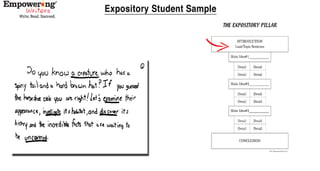
7-Day Process Piece Student Sample Grade 4
One way that I found to ease the tremendous stress of a research project was to break it into manageable chunks for my students. Upon introducing the topic or subject of writing we began by creating a list of everything we knew about the topic and then sorting and categorizing that list.
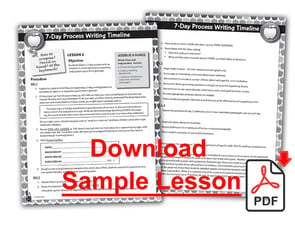
Our journey into the research then became much easier to manage. Students focused on one aspect of the big topic and then began to notice severa l smaller main ideas that matched each focused area. Students found information about the main ideas and then it was time to write. The following piece of exposition is a result of breaking the writing process down into small chunks and wr iting one section of the piece each day for a total of seven days ( see the Expository/Informative Writing Summarizing Framework . ) In the real world, authors do not just write in one big blur, or what some might call flash drafts. They in fact write a section, reflect on that section, and revise it as they go. That is exactly what my students were able to do quite successfully.
What really works in this piece:
- Organizational structure – the pillar
- Word choice – word referents
- Distinct Main Ideas
- The use of research: quote, amazing facts, anecdote
- The voice and tone
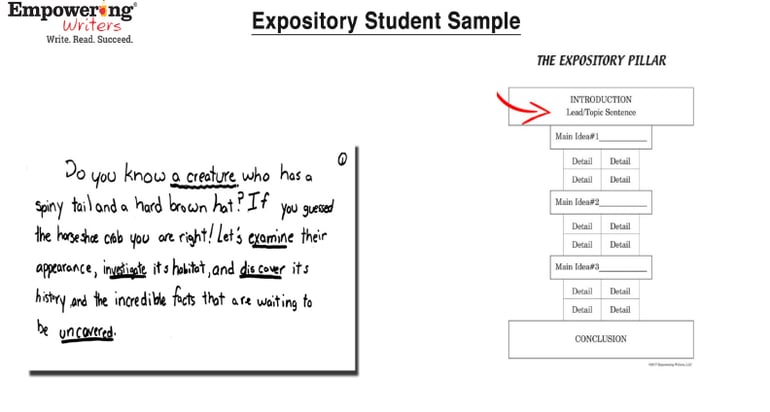
Note the use of informative verbs and the way the author states each main idea in this introduction paragraph.
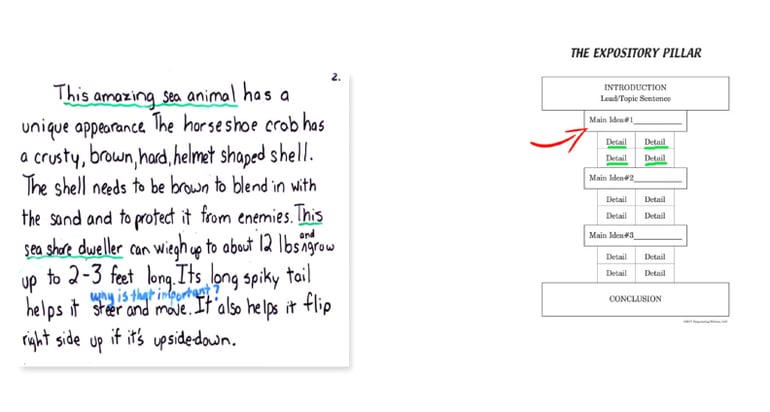
Note the use of “word referents” instead of “the horseshoe crab…the horseshoe crab…the horseshoe crab…” The author uses the productive questions “What does it look like, why is it important?” to add meaningful detail to support the main idea – appearance.
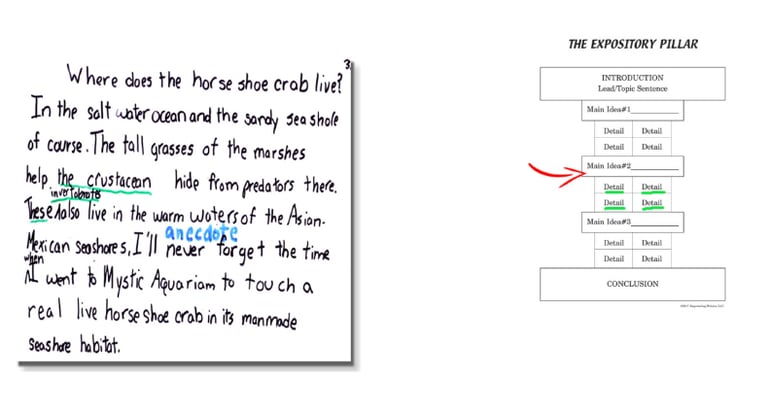
The student states the main idea of this paragraph as a question. This is one strategy taught for revising boring main idea sentences. Note the use of an anecdote to provide interesting detail to support the main idea – habitat.
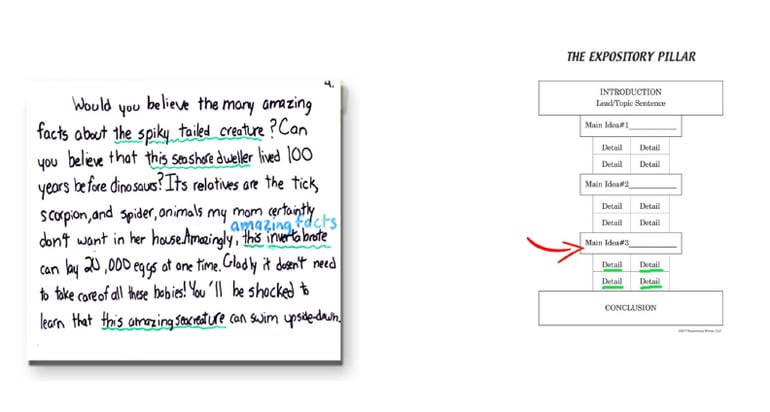
In the conclusion paragraph, the author uses a hypothetical anecdote, informative verbs, a definitive phrase, word referents, and a general restatement of the topic sentence. All of these are strategies taught in EW instruction.
Recommended Resources
- Empowering Writer's Methodology
- Informational & Opinion Writing Guide for Grade 4

Informational Writing Prompts: 50 Ideas to Get You Started
By: Author Paul Jenkins
Posted on August 2, 2023
Categories Writing , Journaling
If you’re looking for a way to improve your writing skills, informational writing prompts are a great place to start. Informational writing is a type of writing that provides readers with information on a specific topic. It can be used to explain how something works, describe a process, or provide readers with new information.
Understanding informational writing is important because it helps you communicate ideas and information effectively. The key to writing effective informational pieces is to do your research. This means finding reliable sources and using them to support your writing. When you use sources, it’s important to cite them properly to avoid plagiarism.
Informational writing prompts can help you practice your writing skills and develop your ability to research and organize information. There are many different types of informational writing, including essays, reports, and articles. Each type has its own unique characteristics, but they all share the goal of providing readers with information.
Key Takeaways
- Informational writing is a type of writing that provides readers with information on a specific topic.
- Doing research is important when writing informational pieces to ensure that the information you provide is accurate and reliable.
- Informational writing prompts can help you practice your writing skills and develop your ability to research and organize information.
99 Informational Writing Prompts
Here are 99 informational writing prompts:
1. Explain the process of photosynthesis.
2. Write a biography of an important historical figure.
3. Explain how clouds form.
4. Describe how a bicycle works.
5. Explain the water cycle.
6. Write about the history of your town or city.
7. Describe how chocolate is made.
8. Explain how flowers grow from seeds.
9. Write about a scientific discovery or invention.
10. Explain how to play a sport or game.
11. Describe the life cycle of an animal.
12. Write about an important current event.
13. Explain how to cook something.
14. Describe how mountains are formed.
15. Explain how an engine works.
16. Write about a planet in our solar system.
17. Describe how weather forecasting works.
18. Explain the process of digestion.
19. Write about an influential artist or musician.
20. Describe how electricity is generated.
21. Explain how planes are able to fly.
22. Write about the effects of pollution.
23. Describe how paper is manufactured.
24. Explain how our bodies fight illness and disease.
25. Write about an important historical event.
26. Describe how musical instruments produce sound.
27. Explain how eclipses occur.
28. Write about an influential civil rights leader.
29. Describe how money is made at the U.S. Mint.
30. Explain how quizzing.chat works.
31. Write about an interesting animal species.
32. Describe how trains operate.
33. Explain the causes of weather phenomena like tornadoes and hurricanes.
34. Write about how computers work.
35. Describe how electricity is distributed from power plants to homes.
36. Explain how the internet functions.
37. Write about the history of a sport or hobby.
38. Describe how bridges are engineered and constructed.
39. Explain how vaccines help prevent disease.
40. Write about an important invention that changed history.
41. Describe how forensic scientists analyze evidence from a crime scene.
42. Explain how volcanoes erupt.
43. Write about an influential activist or social movement.
44. Describe how rockets are launched into space.
45. Explain how earthquakes occur.
46. Write about the benefits of recycling.
47. Describe how telephone and mobile networks operate.
48. Explain how plants reproduce.
49. Write about the history of an art form like painting or dance.
50. Describe how grocery stores receive and display merchandise.
51. Explain how WiFi networks provide internet access.
52. Write about how early explorers charted lands and seas.
53. Describe how clocks and watches measure time.
54. Explain how crystals form.
55. Write about the construction of famous landmarks like the Eiffel Tower.
56. Describe how mail is collected, sorted, and delivered.
57. Explain how the earth rotates on its axis.
58. Write about how photography has evolved over time.
59. Describe how bread is made from grain.
60. Explain how trees grow so tall.
61. Write about how animals adapt to their environments.
62. Describe how musical instruments have changed over time.
63. Explain how ice cream is made.
64. Write about the history of space exploration.
65. Describe how rivers shape the land.
66. Explain how plants get energy from the sun.
67. Write about an influential leader in your field.
68. Describe how dams are constructed.
69. Explain how bees make honey.
70. Write about the benefits of healthy eating and exercise.
71. Describe how rollercoasters use gravity and momentum.
72. Explain how spiders spin webs.
73. Write about the history of your school or workplace.
74. Describe how waves are formed in the ocean.
75. Explain how muscles grow stronger with exercise.
76. Write about a famous speech or influential piece of writing.
77. Describe how musical instruments are designed and built.
78. Explain how snakes move by slithering.
79. Write about how technology has changed communication.
80. Describe how journalists research and write the news.
81. Explain how plants turn sunlight into food.
82. Write about how animals care for their young.
83. Describe how glaciers move and shape the landscape.
84. Explain how clouds produce precipitation.
85. Write about an important historical milestone like the first moon landing.
86. Describe how colors mix to create new shades and hues.
87. Explain how birds fly and migrate long distances.
88. Write about how early sailing ships navigated across oceans.
89. Describe how pianos and guitars make different sounds.
90. Explain how lightning forms during thunderstorms.
91. Write about an influential book or poem.
92. Describe how circadian rhythms regulate sleep cycles.
93. Explain how morse code allows communication through coded signals.
94. Write about the construction of famous monuments like the Statue of Liberty.
95. Describe how tornadoes form and the damage they can cause.
96. Explain how batteries store and discharge electricity.
97. Write about how the human heart pumps blood through the circulatory system.
98. Describe how rainbows form after rainfall.
99. Explain how the tides are influenced by the moon’s gravitational pull.
Understanding Informational Writing
If you’re looking to improve your writing skills, informational writing is a great place to start. Informational writing is a type of writing that is used to explain or inform the reader about a particular topic or subject. It is a way to share knowledge, ideas, and information with others.
When writing informationally, it’s important to use clear and concise language that is easy to understand. This means avoiding complex words and technical jargon unless it is necessary to convey the information accurately. The goal is to communicate the information in a way that is accessible to the reader.
One way to make your informational writing more effective is to use text features. Text features are elements of a text that help to organize and present information. Examples of text features include headings, subheadings, bullet points, and tables. Using text features can help to make your writing more visually appealing and easier to read.
Another important aspect of informational writing is understanding the audience. When writing informationally, it’s important to consider who your audience is and what they already know about the topic. This can help you to tailor your writing to their level of understanding and avoid using information that may be too basic or too advanced.
Overall, informational writing is an important skill to have in today’s world. Whether you’re writing a report for work or sharing information online, being able to communicate effectively through writing is essential. By understanding the basics of informational writing and practicing your skills, you can become a more effective writer and communicator.
The Importance of Research
When it comes to informational writing, research is a crucial step. Without proper research, your writing may lack credibility and accuracy. In this section, we will discuss the importance of research and two sub-sections, Finding Reliable Sources and Fact-Checking.
Finding Reliable Sources
Finding reliable sources is the foundation of good research. You want to ensure that the sources you use are trustworthy and provide accurate information. When searching for sources, consider the following:
- Look for sources from reputable organizations or individuals.
- Check the author’s credentials and background.
- Consider the date of publication. Is the information still relevant?
- Look for sources that provide evidence to support their claims.
By taking the time to find reliable sources, you can ensure that your writing is accurate and trustworthy.
Fact-Checking
Even when you have found reliable sources, it’s important to fact-check the information you use. This means verifying the accuracy of the information and ensuring that it is supported by evidence. Here are some tips for fact-checking:
- Cross-reference information with other sources.
- Look for inconsistencies or contradictions in the information.
- Consider the bias of the source and how it may affect the information presented.
- Use fact-checking tools and resources to verify information.
By fact-checking your writing, you can ensure that your information is accurate and credible.
In conclusion, research is a crucial step in informational writing. By finding reliable sources and fact-checking your information, you can ensure that your writing is accurate, trustworthy, and credible.
Types of Informational Writing
When it comes to informational writing, there are several different types to consider. Each type has its own unique characteristics and serves a specific purpose. In this section, we will explore three of the most common types of informational writing: Informational Essay, Narrative Writing, and Debate.
Informational Essay
An informational essay is a type of writing that aims to inform the reader about a particular topic. These essays typically provide factual information about a subject, and they may be written in a formal or informal style. Informational essays can cover a wide range of topics, from history and science to current events and social issues.
When writing an informational essay, it is important to use reliable sources and provide accurate information. You should also organize your essay in a clear and logical manner, using headings and subheadings to break up the text and make it easier to read. Additionally, you may want to include charts, graphs, or other visual aids to help illustrate your points.
Narrative Writing
Narrative writing is a type of informational writing that tells a story. These stories can be true or fictional, and they may be written in first or third person. Narrative writing is often used to convey information in a more engaging and interesting way than traditional informational writing.
When writing a narrative, it is important to use descriptive language and vivid imagery to bring the story to life. You should also consider the pacing of your story, using dialogue and action to keep the reader engaged. Additionally, you may want to include a moral or lesson at the end of your narrative to help reinforce the information you are trying to convey.
Debate is a type of informational writing that presents arguments for and against a particular topic. These arguments may be written in a formal or informal style, and they may be presented in a structured or unstructured format. The goal of a debate is to convince the reader to take a particular stance on the topic being discussed.
When writing a debate, it is important to consider both sides of the argument and provide evidence to support your position. You should also anticipate counterarguments and address them in your writing. Additionally, you may want to use persuasive language and rhetorical devices to make your argument more compelling.
In conclusion, there are several different types of informational writing, each with its own unique characteristics and purposes. Whether you are writing an informational essay, a narrative, or a debate, it is important to use clear and concise language, provide accurate information, and engage your reader in a meaningful way.
Informational Writing Prompts
If you’re looking for a way to help your child or student improve their writing skills, informational writing prompts are a great place to start. These prompts encourage students to research and write about a variety of topics, from their favorite animals to their daily routines.

Prompts for Elementary School
For younger students, prompts that focus on their personal experiences and interests can be a great way to introduce them to informational writing. Here are a few examples of prompts that are perfect for elementary school students:
- Describe your favorite animal and its characteristics.
- Write about a family member’s occupation and what they do.
- Explain your typical school day and what you learn.
- Look around the room and find something blue. Describe the object and how it’s used.
- What makes someone a hero? Write about a person you consider a hero.
Prompts for 2nd Grade
In second grade, students are starting to develop their writing skills and can handle prompts that require a bit more research and critical thinking. Here are a few prompts that are perfect for second grade students:
- Write about a famous person from history and their accomplishments.
- Research a country and write about its culture, food, and traditions.
- Explain how to make your favorite food or snack.
- Describe a favorite hobby or activity and why you enjoy it.
- Write about a place you’ve visited and what you learned.
Prompts for 4th Grade
By fourth grade, students should be able to write longer, more detailed pieces of informational writing. These prompts are designed to challenge students and encourage them to think critically about the world around them:
- Research a current event and write about why it’s important.
- Write about a scientific concept or process, such as photosynthesis or the water cycle.
- Explain how to solve a math problem or complete a science experiment.
- Research a historical event or figure and write about its significance.
- Write about a social issue, such as bullying or homelessness, and what can be done to address it.
No matter what grade level you’re teaching, informational writing prompts can be a valuable tool for helping students develop their writing skills. By providing clear, engaging prompts that encourage research and critical thinking, you can help your students become confident, knowledgeable writers.
Incorporating Topics into Informational Writing
When it comes to informational writing, choosing a topic is the first and most important step. It is essential to choose a topic that interests you and that you have some knowledge about. In this section, we will explore how to incorporate different topics into your informational writing.
Writing about Sports
Sports are a popular topic for informational writing. You can write about the rules of a particular sport, the history of a sport, or the athletes who play the sport. You can also write about the benefits of playing sports, such as improved physical fitness and teamwork skills. When writing about sports, it is important to use clear and concise language and to provide accurate information.
Writing about Technology
Technology is a vast and ever-changing topic, making it a great choice for informational writing. You can write about the latest innovations in technology, the history of technology, or the impact of technology on society. When writing about technology, it is important to use technical terms correctly and to explain them in a way that is easy to understand for the reader.
Writing about History
History is a fascinating topic for informational writing. You can write about a particular period in history, a historical event, or a famous historical figure. When writing about history, it is important to provide accurate information and to explain the significance of the topic.
Writing about Environment
The environment is an important and timely topic for informational writing. You can write about environmental issues, such as climate change, pollution, or deforestation. You can also write about ways to protect the environment, such as recycling or using renewable energy sources. When writing about the environment, it is important to use clear and concise language and to provide accurate information.
Incorporating different topics into your informational writing can make your writing more interesting and engaging for the reader. By choosing a topic that interests you and using clear and concise language, you can create a piece of writing that is informative and enjoyable to read.
Writing about Personal Experiences
Writing about personal experiences can be a great way to explore your thoughts and feelings and to share your unique perspective with others. Here are a few prompts to get you started:
Your Favorite Holiday
Think about your favorite holiday and what makes it special to you. Is it the traditions, the food, the music, or something else entirely? Write about your favorite holiday and why it means so much to you.
Your Favorite Game
Whether it’s a board game, a video game, or a sport, everyone has a favorite game. Write about your favorite game and why it is so enjoyable for you.
Adopting a Pet
Adopting a pet can be a life-changing experience. Write about your experience adopting a pet and how it has impacted your life.
Writing about Health and Wellness
When it comes to writing about health and wellness, there are many topics to explore. Writing about these topics can help you understand and reflect on your own health habits, as well as share valuable information with others. In this section, we will cover three sub-sections: Healthy Diet, Exercise, and Mental Health.
Healthy Diet
Writing about a healthy diet can be a great way to reflect on your own eating habits and learn more about nutrition. Some writing prompts to consider include:
- What are your favorite healthy meals or snacks?
- What are some healthy foods that you have tried recently?
- How do you plan your meals for the week?
- What are some healthy substitutions you can make in your favorite recipes?
When writing about a healthy diet, it’s important to focus on balanced meals that include plenty of fruits, vegetables, whole grains, and lean proteins. Avoid making exaggerated or false claims about the benefits of specific foods or diets.
Writing about exercise can help you reflect on your own physical activity habits and explore different types of workouts. Some writing prompts to consider include:
- What is your favorite way to exercise?
- How do you stay motivated to exercise regularly?
- What are some new types of workouts you would like to try?
- How do you fit exercise into your busy schedule?
When writing about exercise, it’s important to emphasize the importance of regular physical activity for overall health and well-being. Avoid making exaggerated or false claims about the benefits of specific types of exercise or workouts.
Mental Health
Writing about mental health can help you reflect on your own emotional well-being and explore different ways to manage stress and anxiety. Some writing prompts to consider include:
- What are some strategies you use to manage stress?
- What are some activities that help you relax and unwind?
- How do you prioritize self-care in your daily routine?
- What are some resources you turn to when you need support?
When writing about mental health, it’s important to emphasize the importance of seeking professional help when needed and avoiding stigmatizing language. Encourage readers to prioritize their mental health and seek support when necessary.
Overall, writing about health and wellness can be a valuable way to reflect on your own habits and share information with others. By using neutral, clear language and avoiding exaggerated or false claims, you can create informative and helpful content that encourages readers to prioritize their health.
Writing about Social Issues
When it comes to informational writing prompts, social issues are a great topic to explore. Writing about social issues can help you develop your critical thinking skills and become more aware of the world around you. In this section, we will explore two common social issues: bullying and the cost of college.
Bullying is a serious problem that affects many people. If you are interested in writing about bullying, you might want to consider the following topics:
- The different types of bullying (verbal, physical, cyberbullying)
- The effects of bullying on the victim
- The reasons why people bully others
- Ways to prevent bullying
When writing about bullying, it is important to be sensitive to the topic and avoid making exaggerated or false claims. You should also consider including statistics or personal stories to make your writing more impactful.
Cost of College
The cost of college is another important social issue that affects many people. If you are interested in writing about the cost of college, you might want to consider the following topics:
- The rising cost of tuition and fees
- The impact of student loan debt on graduates
- The reasons why college is so expensive
- Ways to make college more affordable
When writing about the cost of college, it is important to be knowledgeable about the topic and avoid making exaggerated or false claims. You should also consider including statistics or personal stories to make your writing more impactful.
Overall, writing about social issues can be a great way to develop your writing skills and become more aware of the world around you. By exploring topics like bullying and the cost of college, you can gain a deeper understanding of the issues that affect people every day.
Practical Applications of Informational Writing
Informational writing is a valuable skill that can be applied in many practical ways. Whether you are writing directions for a recipe or explaining the ins and outs of a particular occupation, informational writing is an effective way to communicate information clearly and concisely.
Writing Directions
One practical application of informational writing is writing directions. Whether you are writing a recipe, explaining how to assemble a piece of furniture, or providing instructions for a science experiment, writing clear and concise directions is essential. When writing directions, it is important to use clear and specific language, break down complex tasks into smaller steps, and use bullet points or numbered lists to make the information easier to follow.
Writing about Occupations
Another practical application of informational writing is writing about occupations. This type of writing can be used to provide information about a particular job, including the skills and knowledge required, the typical duties and responsibilities, and the education and training needed to pursue the career. When writing about occupations, it is important to research the job thoroughly, interview people who work in the field, and use clear and concise language to convey the information.
Overall, informational writing is a practical and valuable skill that can be applied in many different contexts. Whether you are writing directions, explaining a complex concept, or providing information about a particular occupation, the key is to use clear and concise language, break down complex information into smaller, more manageable chunks, and use formatting and other tools to make the information easier to read and understand.
Improving Your Informational Writing Skills
If you want to improve your informational writing skills, you have come to the right place. Whether you are a student or an adult, there are plenty of ways to enhance your writing abilities and create engaging content that is informative and student-friendly.
Know Your Audience
One of the most important aspects of informational writing is understanding your audience. You need to know who you are writing for and what they want to learn. For example, if you are writing for a middle school audience, you may want to use simpler language and provide more examples to help them understand the topic.
Use Clear and Concise Language
When writing informational pieces, it is important to use clear and concise language. Avoid using complicated words and phrases that your readers may not understand. Instead, use simple language that is easy to read and comprehend.
Provide Relevant Examples
Including relevant examples is a great way to help your readers understand the topic you are writing about. Use real-life examples or scenarios to illustrate your points and make your content more engaging.
Use Formatting to Your Advantage
Formatting can make a big difference in how your content is received. Use bullet points, tables, and headings to organize your content and make it easier to read. Bold important information to make it stand out and use a consistent font and size throughout your piece.
Practice Makes Perfect
Finally, the best way to improve your informational writing skills is to practice. Write regularly and seek feedback from others to help you improve. The more you write, the better you will become.
By following these tips, you can improve your informational writing skills and create content that is informative, engaging, and student-friendly.
Common Core Standards for Informational Writing
If you’re looking to improve your informational writing skills, it’s important to understand the Common Core State Standards for Writing. These standards were developed to ensure that students have the necessary writing skills to succeed in college and in their careers.
The Common Core State Standards for Writing include three types of writing: argumentative, informative/explanatory, and narrative. Informational writing, also known as informative/explanatory writing, is a type of writing that aims to convey information to the reader.
According to the Common Core Standards, informative/explanatory writing should be organized in a clear and logical manner, using appropriate facts and details to support the main idea. The writing should also use precise language and domain-specific vocabulary to convey the information effectively.
In addition, the Common Core Standards require that informative/explanatory writing should be adapted to the audience and purpose of the writing. This means that the writing should be appropriate for the intended audience, and should be written with a clear purpose in mind.
To meet the Common Core Standards for informative/explanatory writing, students should be able to:
- Introduce a topic clearly and provide a general observation or statement about the topic.
- Develop the topic with facts, definitions, and details.
- Use precise language and domain-specific vocabulary to convey information.
- Use appropriate transitions to clarify the relationships among ideas and concepts.
- Provide a conclusion that follows from and reflects on the information presented.
By following these guidelines, you can improve your informational writing skills and meet the Common Core Standards for Writing.
Frequently Asked Questions
What are some examples of informational writing prompts for middle school students.
Some examples of informational writing prompts for middle school students include writing about a current event or news story, explaining the process of how something works, or researching and writing about a historical figure or event.
What are the key components of effective informational writing prompts?
Effective informational writing prompts should be clear, concise, and relevant to the students’ interests and experiences. They should also provide a clear purpose and audience for the writing, and include specific criteria for success.
How can teachers differentiate informational writing prompts for students of different grade levels?
Teachers can differentiate informational writing prompts by adjusting the complexity of the topic, the required research or sources, and the expectations for the final product. They can also provide different levels of support, such as graphic organizers or sentence starters, based on the needs of individual students.
What are some creative ways to engage students with informational writing prompts?
Some creative ways to engage students with informational writing prompts include using multimedia sources such as videos or podcasts, incorporating student choice in topic selection, and connecting the writing to real-world issues or events. Teachers can also provide opportunities for students to share and discuss their writing with peers.
What are some common mistakes to avoid when creating informational writing prompts?
Common mistakes to avoid when creating informational writing prompts include using vague or overly broad topics, failing to provide clear criteria for success, and neglecting to consider the students’ interests and experiences. It is also important to avoid bias or stereotypes in the topic or sources provided.
How can informational writing prompts help students develop critical thinking skills?
Informational writing prompts require students to research and analyze information, evaluate sources, and synthesize ideas into a coherent written product. By engaging in this process, students develop critical thinking skills such as problem-solving, decision-making, and analysis.

25 Informative Essay Writing Prompts for the Secondary ELA Classroom
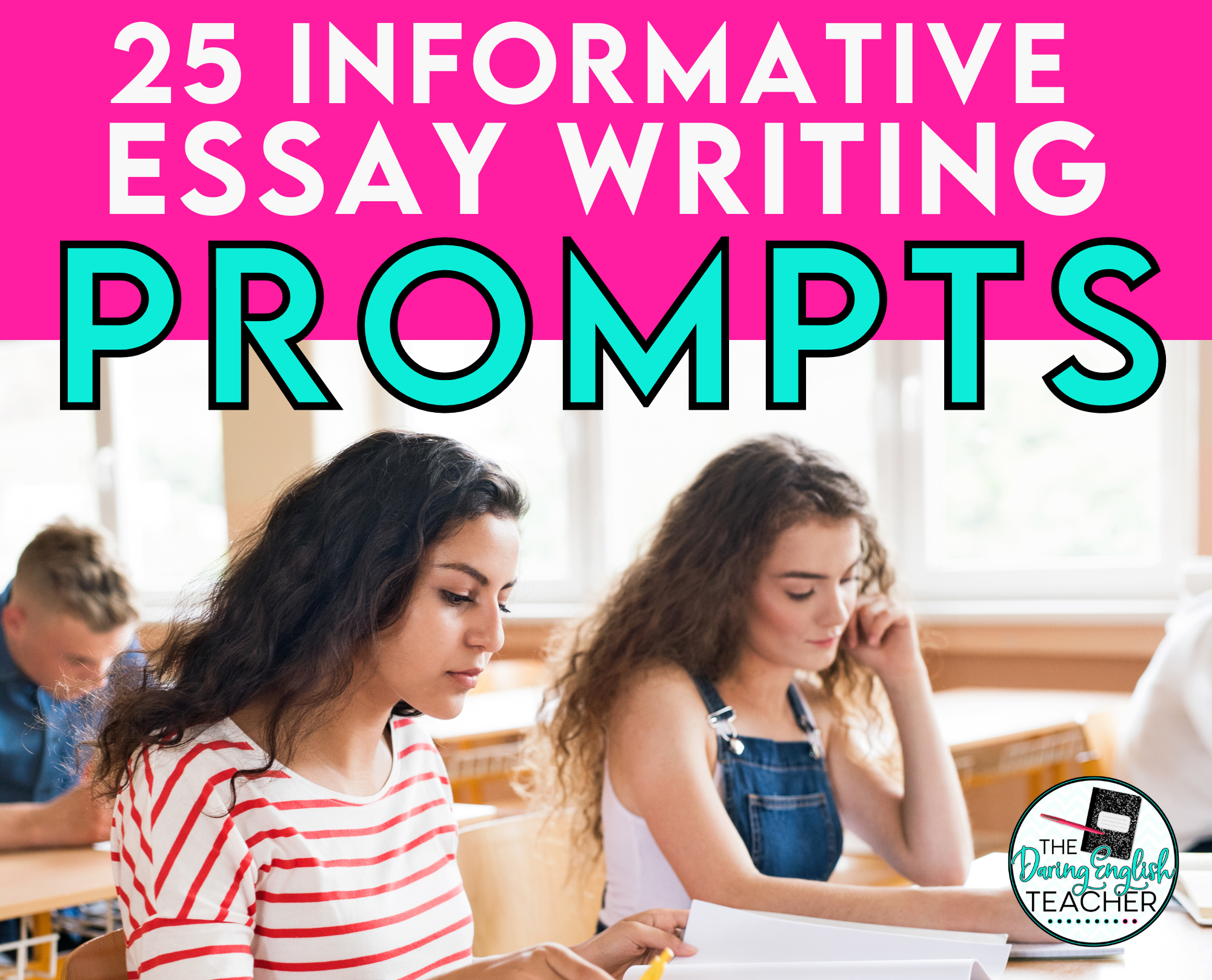
Looking for informative essay writing prompts? I’ve got you covered!
An informative essay is a staple in middle school ELA and high school English classrooms. An informative essay is a type of writing meant to inform the reader about a specific topic. Informative essays are based on facts and evidence and are not meant to persuade or argue a particular point of view.
When I teach informative essay writing to my students, I specify that essays should all be in one tense and written entirely in the third person. To help my students keep their writing in the third person, I like to use this Writing Spotlight: Writing in the Third Person mini-unit alongside my Informational Essay Writing Unit .
I’ve got you covered if you are looking for informational, informative, or explanatory writing prompts to use in your classroom!
Here are 25 informative essay writing prompts to get you started.
- Write an informational essay about the history and significance of a major world event (e.g. the fall of the Berlin Wall, the first moon landing)
- Write an informational essay about the life and accomplishments of a significant historical figure (e.g. Albert Einstein, Mahatma Gandhi)
- Write an informational essay about the causes and effects of a major environmental issue (e.g. climate change, deforestation)
- Write an informational essay about self-driving cars,
- Write an informational essay about an endangered animal and its habitat.
- Write an informational essay about the development and impact of a major scientific or technological breakthrough (e.g. the invention of the internet, the discovery of antibiotics)
- Write an informational essay about the role and importance of a specific branch of government (e.g. the judicial branch, the executive branch)
- Write an informational essay about the effects of a natural disaster (e.g. an earthquake, a hurricane) on a specific community or region
- Write an informational essay about the history and significance of a major cultural movement (e.g. the Harlem Renaissance, the feminist movement)
- Write an informational essay about the impact of social media on communication and relationships
- Write an informational essay about the causes and effects of poverty in a specific region or country
- Write an informational essay about what makes someone a hero.
- Write an informational essay about the impact of globalization on the economy and culture of a specific country or region
- Write an informational essay about the causes and effects of obesity in the United States
- Write an informational essay about the effects of advertising on consumer behavior
- Write an informational essay about the effects of air pollution on human health and the environment
- Write an informational essay about the role and impact of the media in shaping public opinion
- Write an informational essay about three causes of social media addiction
- Write an informational essay about the causes and consequences of cyberbullying
- Write an informational essay about the impact of video games on mental health and social development
- Write an informational essay about how sugar affects the brain
- Write an informational essay about the history and significance of a major world landmark (e.g. the Great Wall of China, the Eiffel Tower)
- Write an informational essay about the role and impact of the arts in society
- Write an informational essay about the effects of music on the brain and behavior
- Write an informational essay about the impact of technology on the education system and learning.
I hope that you find these informative essay writing prompts helpful!
If you are looking for more writing prompts, be sure to check out these additional blog posts:
- 50 Argument Essay Prompts
- Growth Mindset Writing Prompts
- Back-to-School Writing Prompts
Informative Essay Teaching Unit
Engage your students in this informational and expository essay unit that will help them learn how to write academically! This explanatory, expository, and informational writing unit includes everything you need to teach informational and explanatory writing to your middle and high school students. Plus, all of the digital and print materials are included!
What teachers are saying:
⭐️⭐️⭐️⭐️⭐️ Extremely satisfied
“ This is a fantastic resource. The graphic organizers have been amazing for supporting my students as they write essays. The guide says it is for grades 7th through 10th, but I am working with my 6th graders on informative writing and I think these are great resources and tools for them too. Thank you!”
“ Amazing product. This has everything you need to strengthen your student’s writing skills. The Daring English Teacher’s Blog is what I recommend for all my new teacher friends so they can see what a quality lesson includes. The handouts are easy to follow, and slide decks are thoughtfully laid out.”
Leave a Reply Cancel reply
Your email address will not be published. Required fields are marked *
Save my name, email, and website in this browser for the next time I comment.

SUBSCRIBE NOW

Reading & Math for K-5
- Kindergarten
- Learning numbers
- Comparing numbers
- Place Value
- Roman numerals
- Subtraction
- Multiplication
- Order of operations
- Drills & practice
- Measurement
- Factoring & prime factors
- Proportions
- Shape & geometry
- Data & graphing
- Word problems
- Children's stories
- Leveled Stories
- Context clues
- Cause & effect
- Compare & contrast
- Fact vs. fiction
- Fact vs. opinion
- Main idea & details
- Story elements
- Conclusions & inferences
- Sounds & phonics
- Words & vocabulary
- Reading comprehension
- Early writing
- Numbers & counting
- Simple math
- Social skills
- Other activities
- Dolch sight words
- Fry sight words
- Multiple meaning words
- Prefixes & suffixes
- Vocabulary cards
- Other parts of speech
- Punctuation
- Capitalization
- Narrative writing
- Opinion writing
- Informative writing
- Cursive alphabet
- Cursive letters
- Cursive letter joins
- Cursive words
- Cursive sentences
- Cursive passages
- Grammar & Writing
Breadcrumbs

Download & Print Only $6.89
Informative writing for grade 4
Research and essays.
These worksheets introduce students to informative writing , including research, note taking, recording sources and writing essays.
Writing Introductions : Write hooks and topic sentences.
Supporting Details : Write details supporting the main ideas.
Writing informative paragraphs : Incorporate facts and examples into the text.
Writing informative essays : Plan and write an essay.
Compare and contrast writing : Compare and contrast two items.
Research writing : Research, take notes and write.
Biography writing : Research and write about a famous person.
Informative writing prompts : Prompts for informative essays.

Grade 4 informative writing worksheet
What is K5?
K5 Learning offers free worksheets , flashcards and inexpensive workbooks for kids in kindergarten to grade 5. Become a member to access additional content and skip ads.

Our members helped us give away millions of worksheets last year.
We provide free educational materials to parents and teachers in over 100 countries. If you can, please consider purchasing a membership ($24/year) to support our efforts.
Members skip ads and access exclusive features.
Learn about member benefits
This content is available to members only.
Join K5 to save time, skip ads and access more content. Learn More
- Forgot Password?

How to Teach Informative Writing
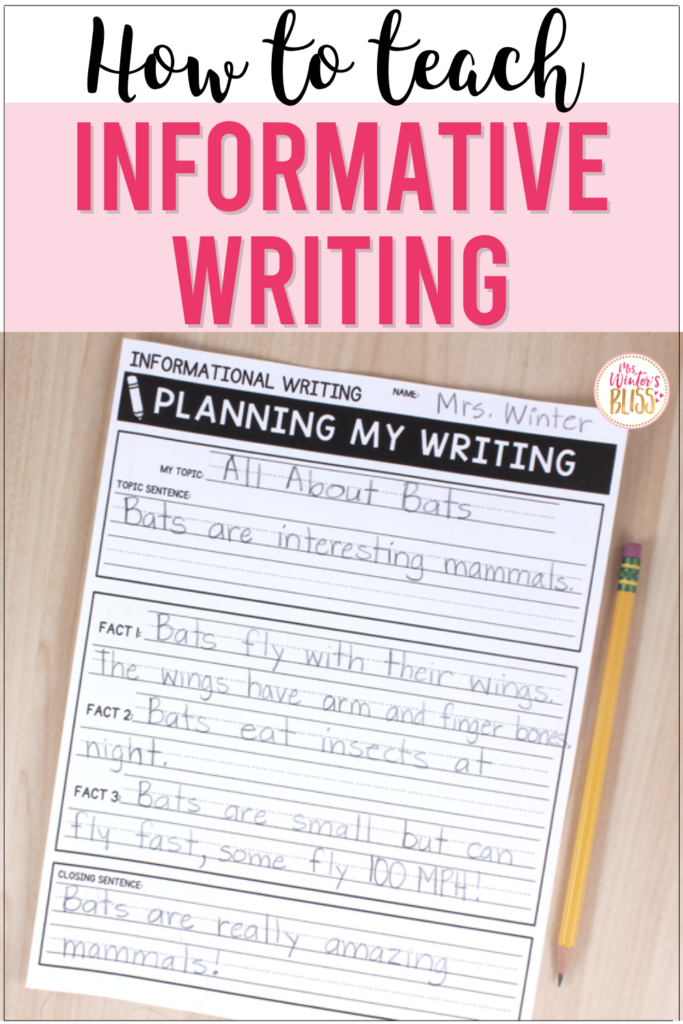
n this post, I share 5 tips for How to Teach Informative Writing and provide details about my Informational Writing Unit resources for for Kindergarten, 1st and 2nd grade students. Be sure to download 3 FREE Informational Writing Graphic Organizers!
We write for a variety of purposes. The most popular are to inform, entertain, explain, or persuade. While we teach our students to write for each of these different purposes, the ability to effectively write an informative piece of writing is a highly important skill for students to learn. It is one of the most common types of writing we use in our everyday lives.

Today I’m excited to share 5 tips for teaching informational writing, as well as a valuable resource that has everything you need to teach informative writing to your kindergarten , first grade , or second grade students!
1. Read Informative Writing Mentor Texts
As a teacher, you may “Start with the end in mind” when you plan out your units of study, but it also applies to students learning about different genres of writing. Before you can ask your students to write in a genre that is new to them, you must first immerse them in it.
So to begin your informational writing unit, you’ll want to share lots of quality informational texts with your students. These mentor texts provide students with excellent examples of informational writing. As you read them aloud, highlight the way the author structures their writing and the features they include to help make their writing more clear for the reader. All of these things will help students better understand what type of writing we are asking them to do.

When you’re picking informative mentor texts to share with your students there are a few things to consider . First, do you (the educator) think it is excellent? Second, is it easy for your students to understand? And finally, is it relevant to the type of writing you are teaching? If you answer “Yes!” to all three, then you’re good to go!
To help you out I’ve created a list of excellent mentor texts you can use when teaching Informative Writing to kindergarten, first, or second grade students.
A List of Informative Writing Mentor Texts:
Gail Gibbons
- The Moon Book
- The Pumpkin Book
Nicola Davies
- One Tiny Turtle
- Big Blue Whale
- Bat Loves the Night
- Surprising Sharks
Jim Arnosky
- Slither and Crawl
- Frozen Wild
- Beachcombing: Exploring the Seashore
Diana Aston
- An Egg is Quiet
- A Beetle is Shy
- A Seed is Sleepy
- A Rock is Lively
I’ve saved all these titles on one board so you can easily take a closer look at these mentor texts. Click here to see this list on Amazon .
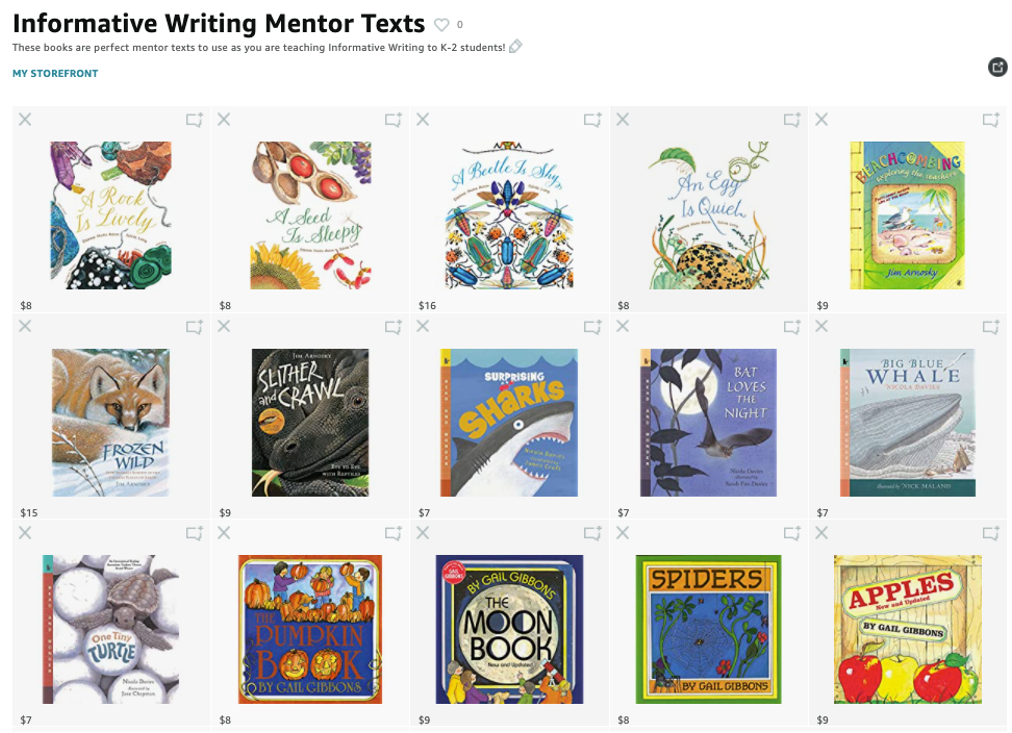
2. Model Your Own Informational Writing
Never underestimate the importance of modeling! It’s the most powerful tool in your arsenal.
When teaching informative writing first model how to choose a topic. Picking a topic is fun and easy because you get to choose something you already know a lot about!
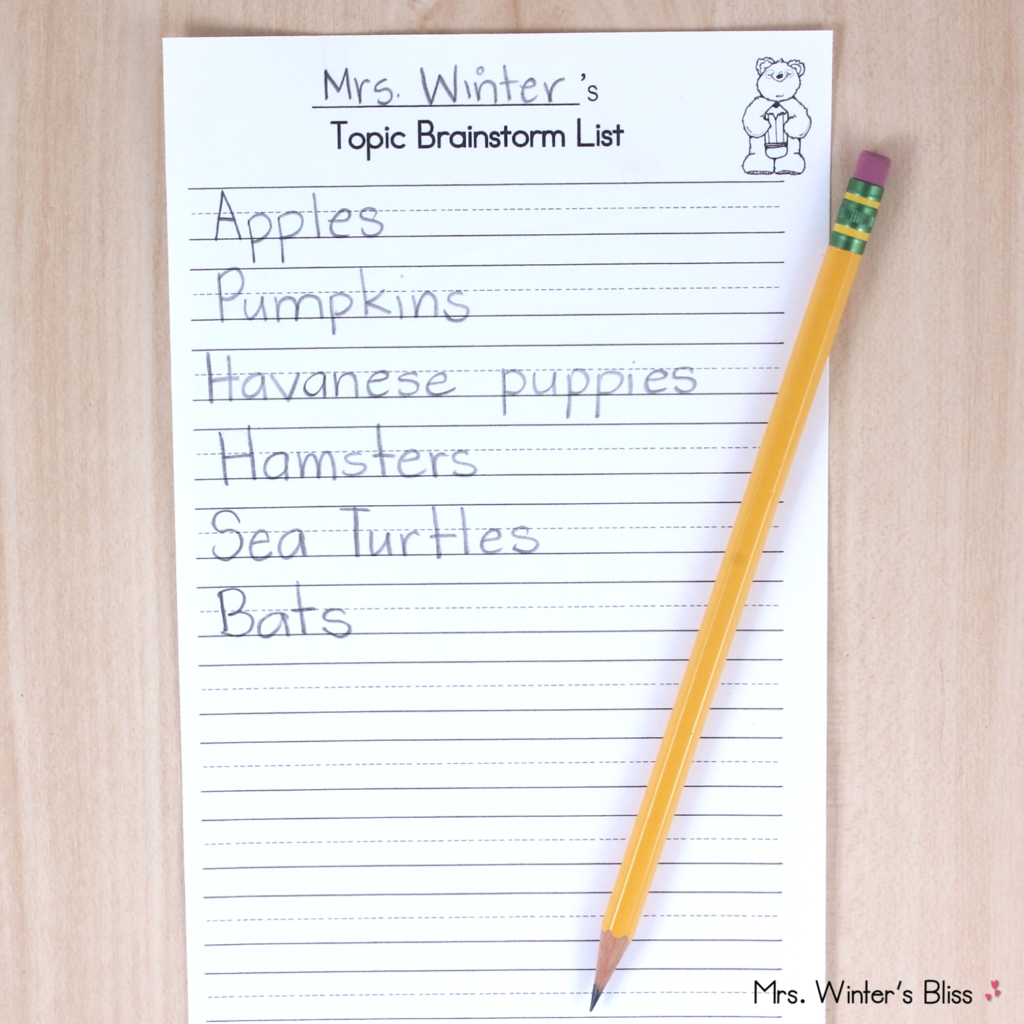
Remind students that they are already experts in so many areas!! This can be a big confidence booster for kids who might normally struggle to come up with ideas to write about. Use think alouds to show them how you brainstorm a list of topics you already know a lot about and show them how you narrow it down to one.
Next, model how you gather information and organize your ideas. For informative writing you can show them how you use your prior knowledge, as well as pull important information from outside resources like books and websites.
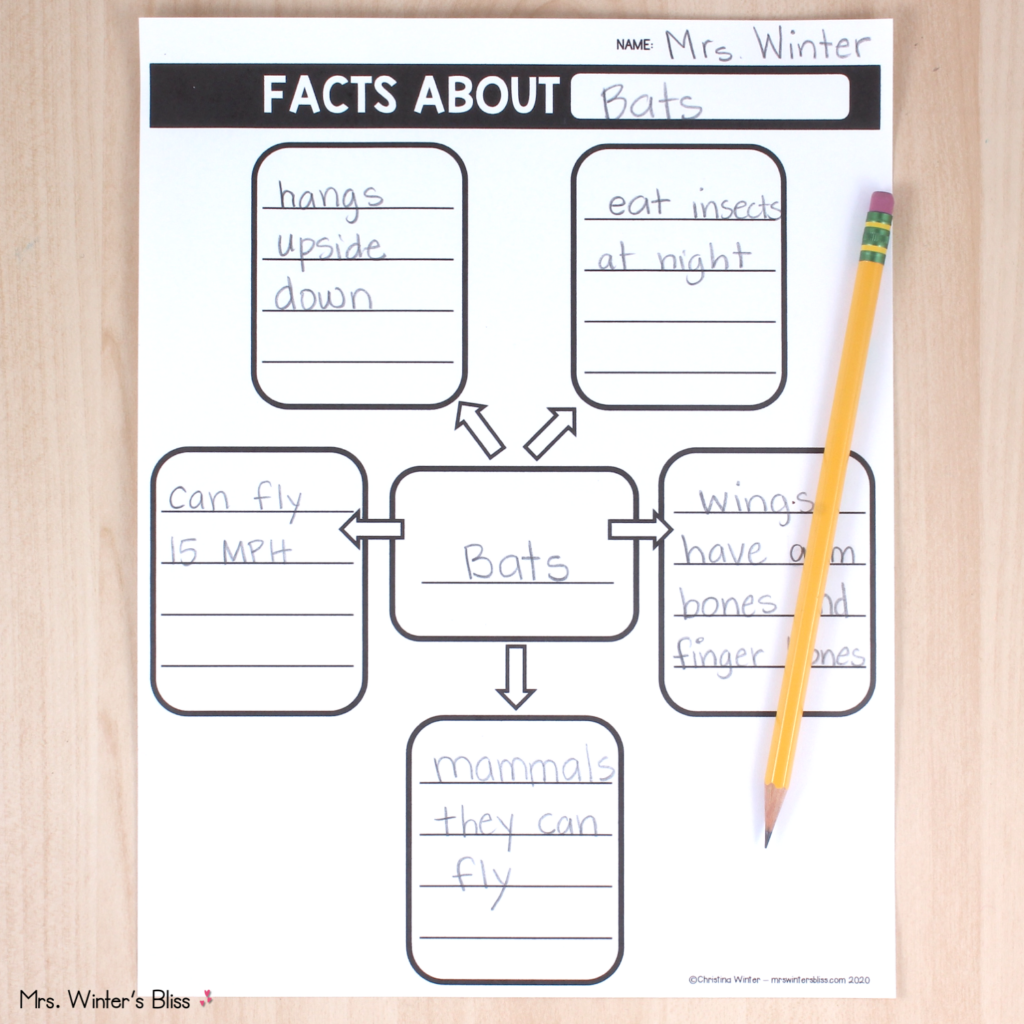
Finally, reread your work aloud and show students how you catch silly mistakes such as spelling, capitalization or punctuation errors. You can also show how you add more details to make your piece more informative for your reader.
3. Use Anchor Charts
You want your students to know that when they write an informative piece they are sharing facts, or true information, with their reader. They are not sharing their opinion. It is important to take time to review fact vs. opinion with your students. You can create an anchor chart that clearly defines fact vs. opinion and then practice determining if different statements are facts or opinions.
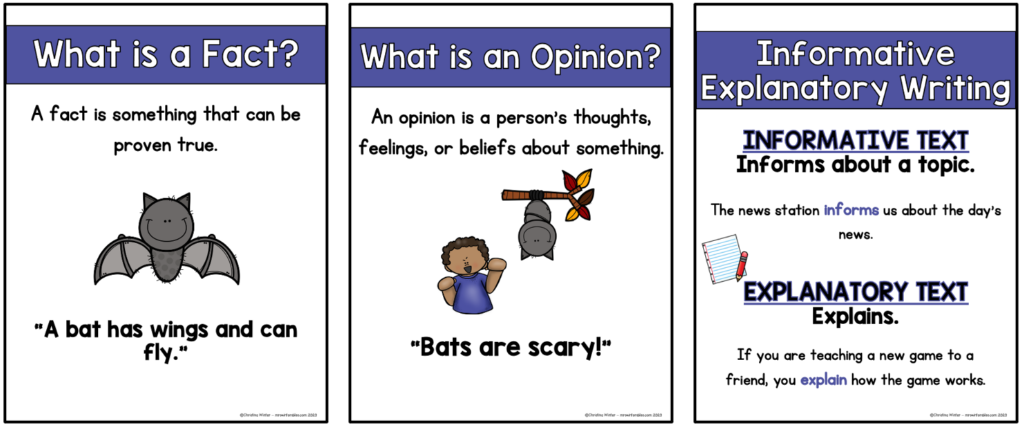
You will also want to create an anchor chart using the writing you model. This will serve as another example of excellent informative writing. As a class, add labels to identify the topic sentence, supporting facts/details and the closing sentence in your shared writing.
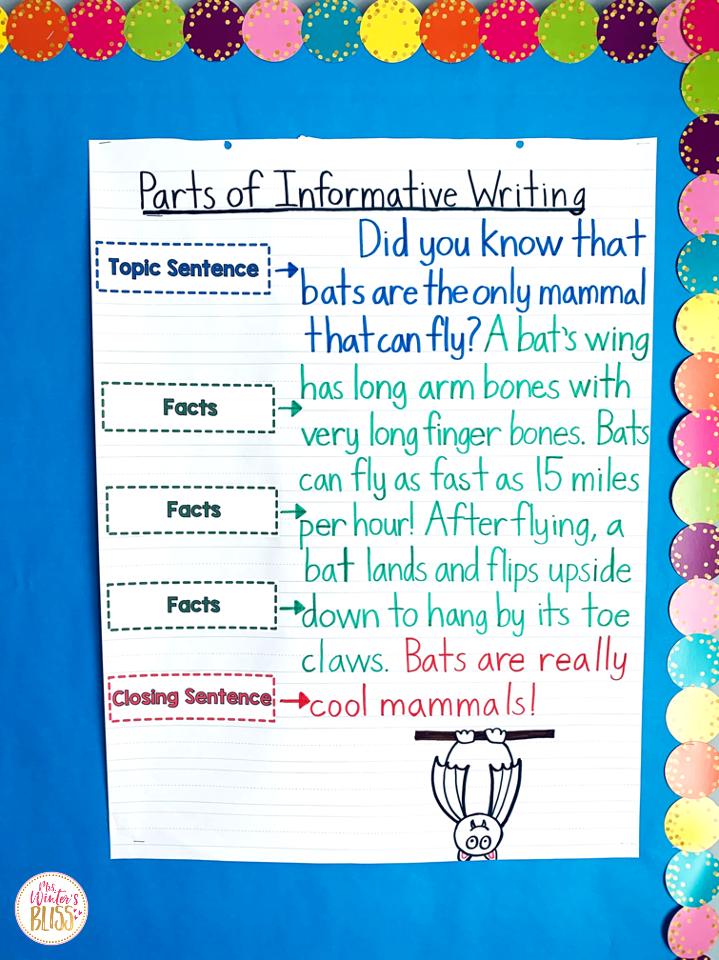
Post these anchor charts in your writing center so your students can refer back to them and use them as support as they write their own pieces.
4. Allow students to edit and share their writing
Provide a good writers checklist at your writing center. For informative writing you’ll want the checklist to include items such, “Does my writing have a topic sentence?” “Did I include enough facts?” and “Do I have a closing sentence?”, as well reminders to check for spelling, capitalization, and punctuation errors.
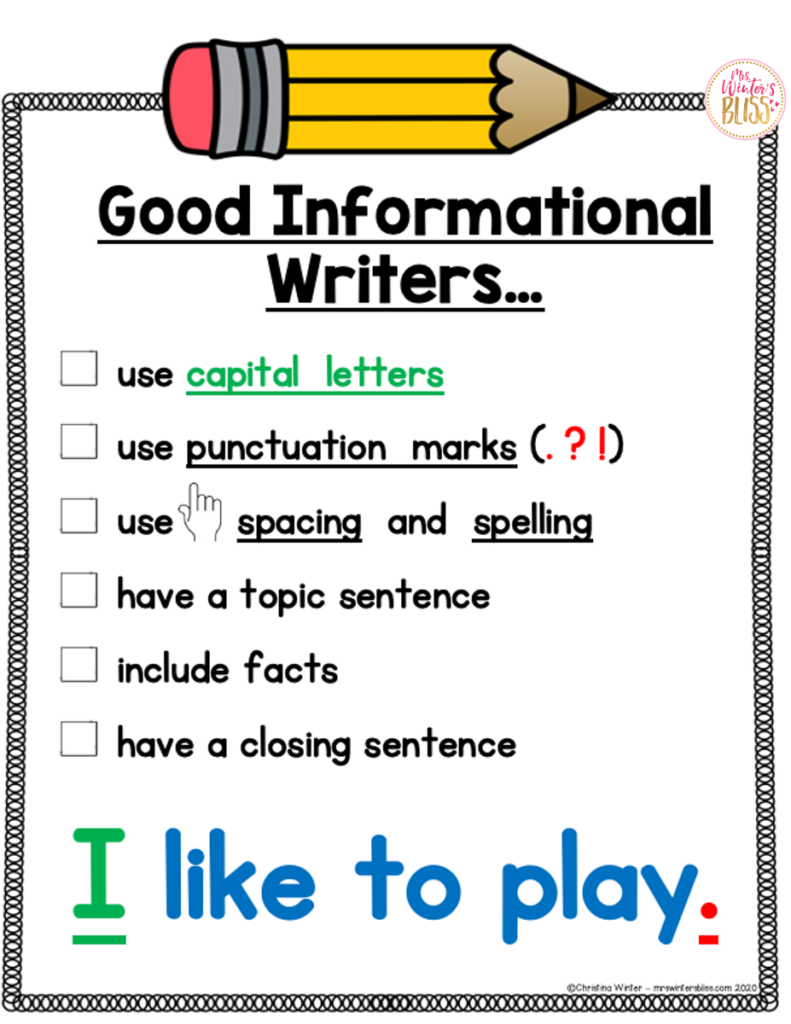
Give students the opportunity to share their writing with others! Pair students with partners and let them read their pieces to each other.

You can teach them to provide each other with a bit of feedback by encouraging them to use sentence starters such as, “I like the way you….:” , “I learned that….” or “Your writing made me wonder….”. Of course, this is also something you’d first want to model. Posting these sentence starters in your writing center provides support and helps to keep students focused and on-task.
5. Provide Daily Opportunities for Students to Write
As with all things, writing takes PRACTICE! Informative writing requires students to do a lot of hard work. It requires that they think carefully about their purpose for writing. Then they must plan what they’ll say and how they’ll say it.
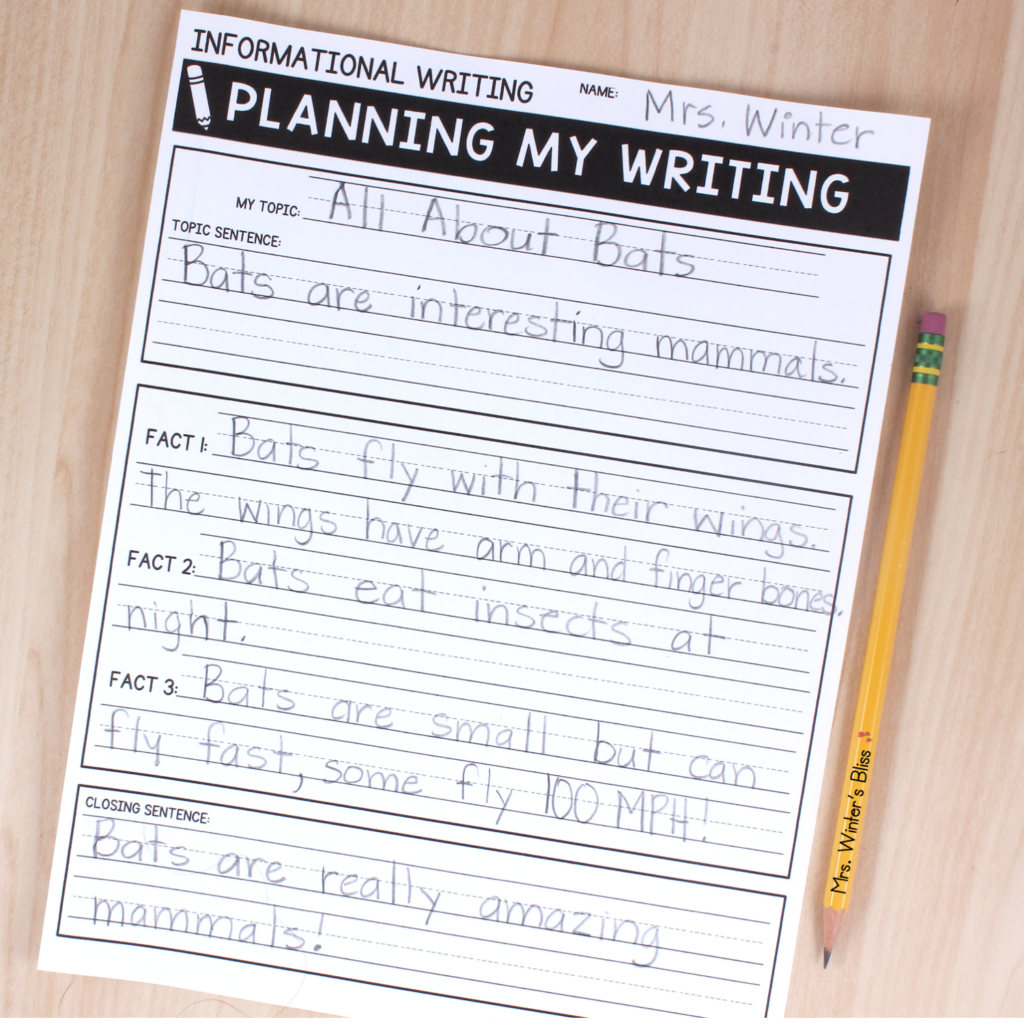
Finally, they’ve got to get it down on the paper in a way that is clear for the reader. That’s a lot for a young child!
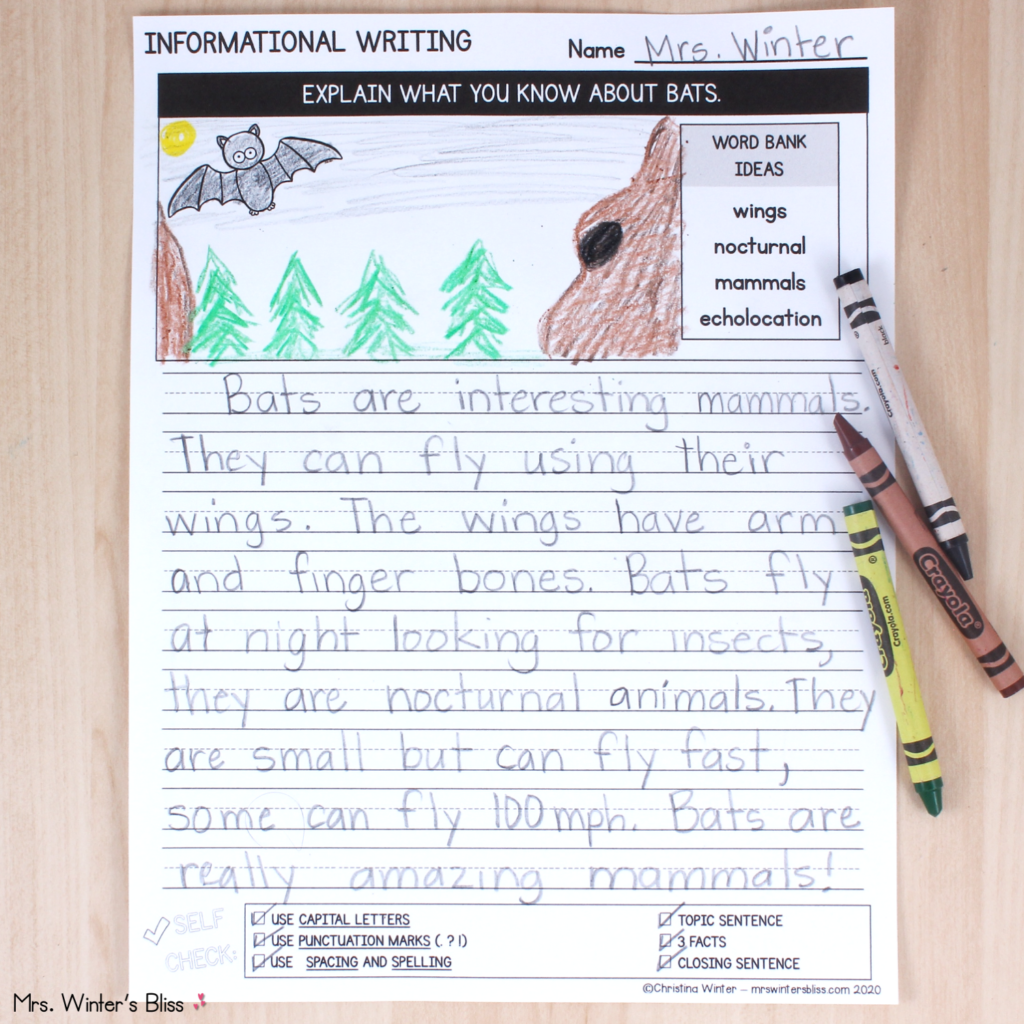
Students need dedicated instructional time to learn the skills and strategies necessary to become effective writers, as well as time to practice what they learn. When you think about your daily instructional schedule, make sure you are giving your students ample opportunities to practice their informational writing through whole group instruction, small groups and/or through independent practice in writing centers.
Informative Writing Unit For Kindergarten, First, and Second Grade Students
We know informational writing requires a lot from students, but planning these informative writing units is also A LOT of work for you as the teacher!
To help you out I created informative writing units that have the essential resources you need to teach and students to independently practice informational writing! These units are a perfect addition to your literacy work in writing centers.
Today I’m excited to share with you the details about my Kindergarten Informative , 1st Grade Informative, and my 2nd grade Informative writing units!
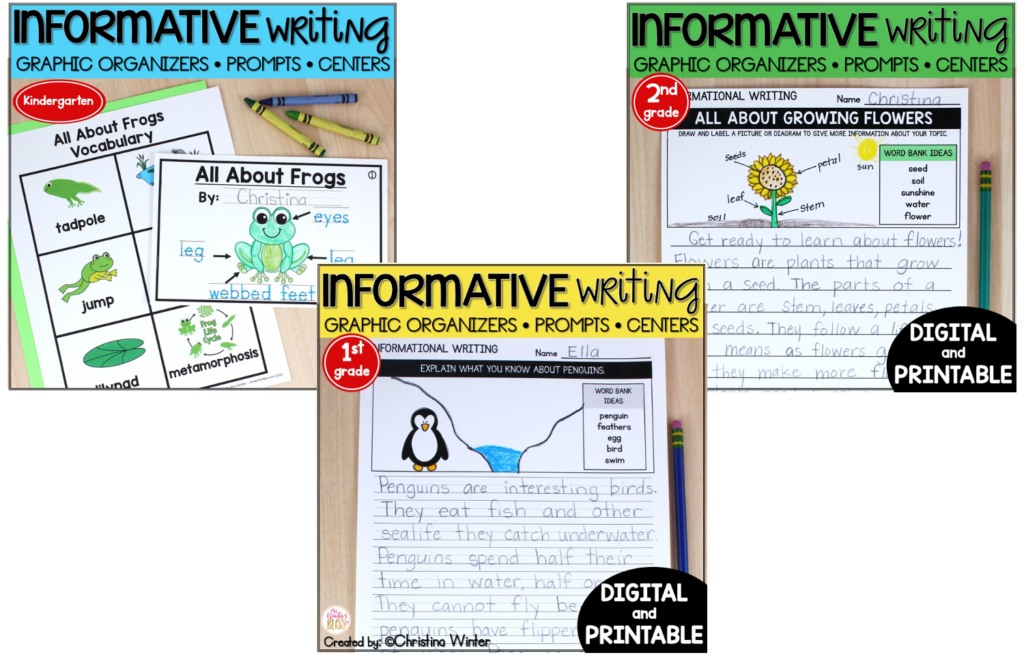
These units were developed with standards-based research specific to each grade. They have EVERYTHING you need to give your students ample amounts of practice writing informational pieces. You can use them within whole class or small group lessons, or as a literacy center where students can practice independently!
What’s Included in these Informative Writing Resources?
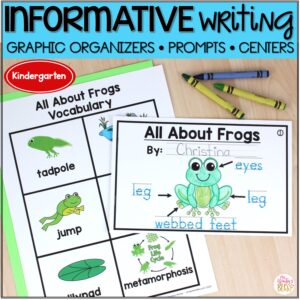
The kindergarten , first grade, and the second grade resources all include information to help you teach the unit, as well as mini-lesson to provide your students a review of informative writing. You’ll get a list of suggested mentor texts and online resources, academic vocabulary posters, a printable fact vs. opinion anchor chart, and graphic organizers appropriate for each grade level.
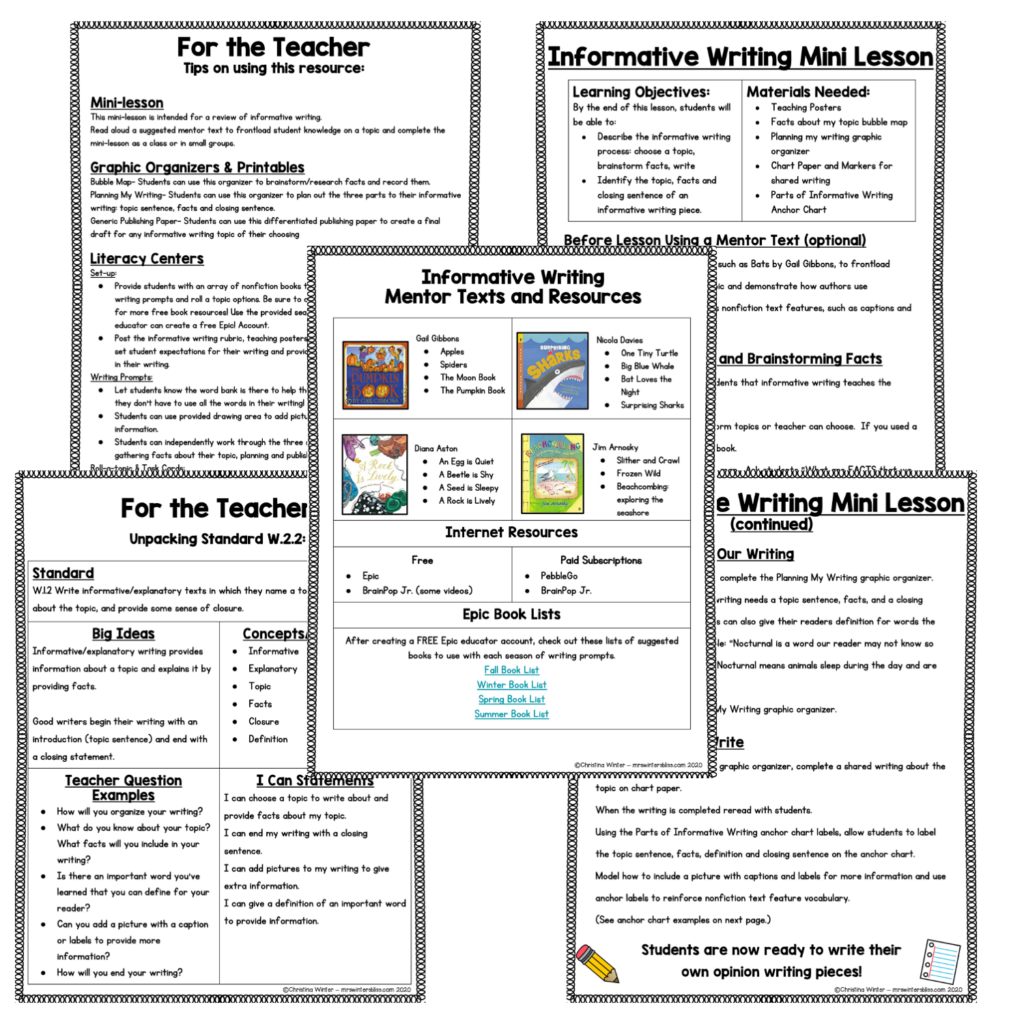
The kindergarten resource also includes the materials needed for students to create seasonal writing mini-books . Each mini-book comes with traceable sentence stems and a picture supported vocabulary word bank. This helps your young writers brainstorm ideas for what to write about and support their spelling.
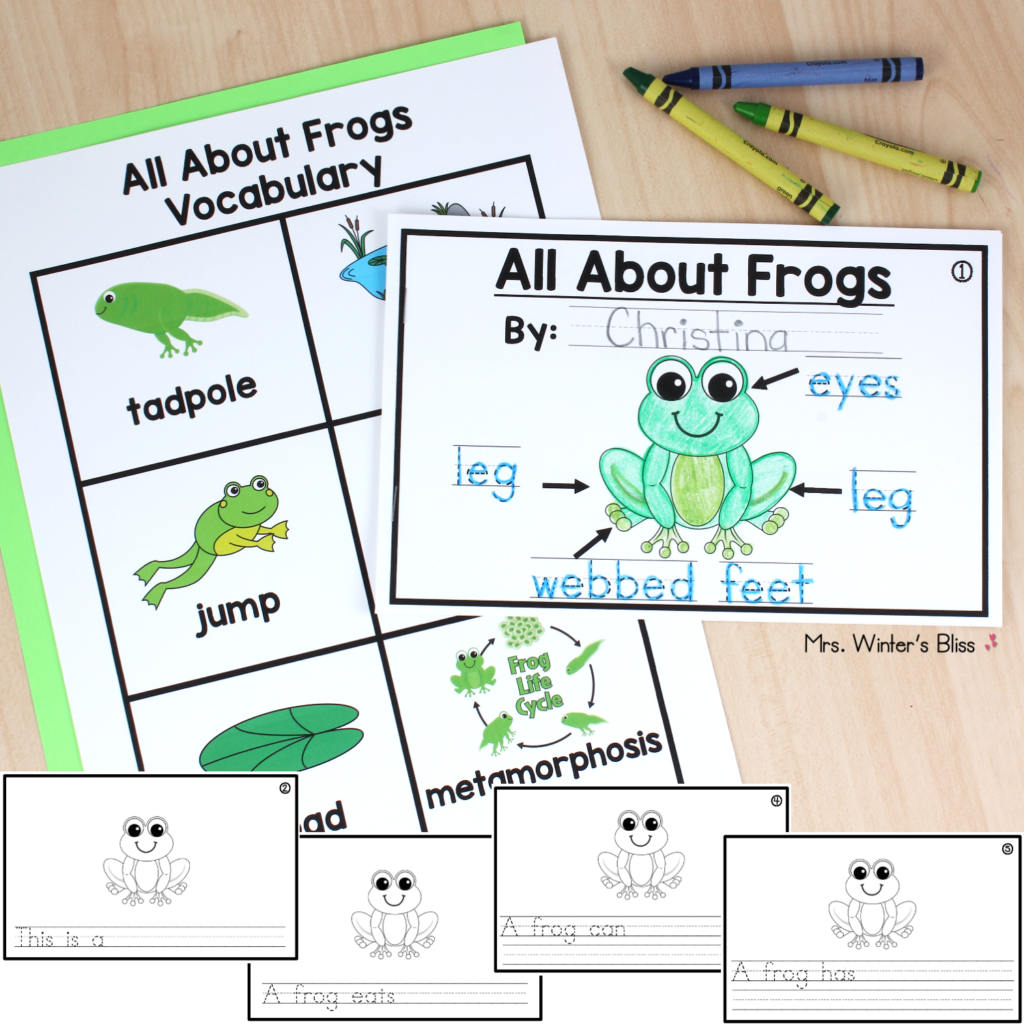
You’ll also get an editing checklist that is specific to informative writing but also appropriate for the kindergarten level.
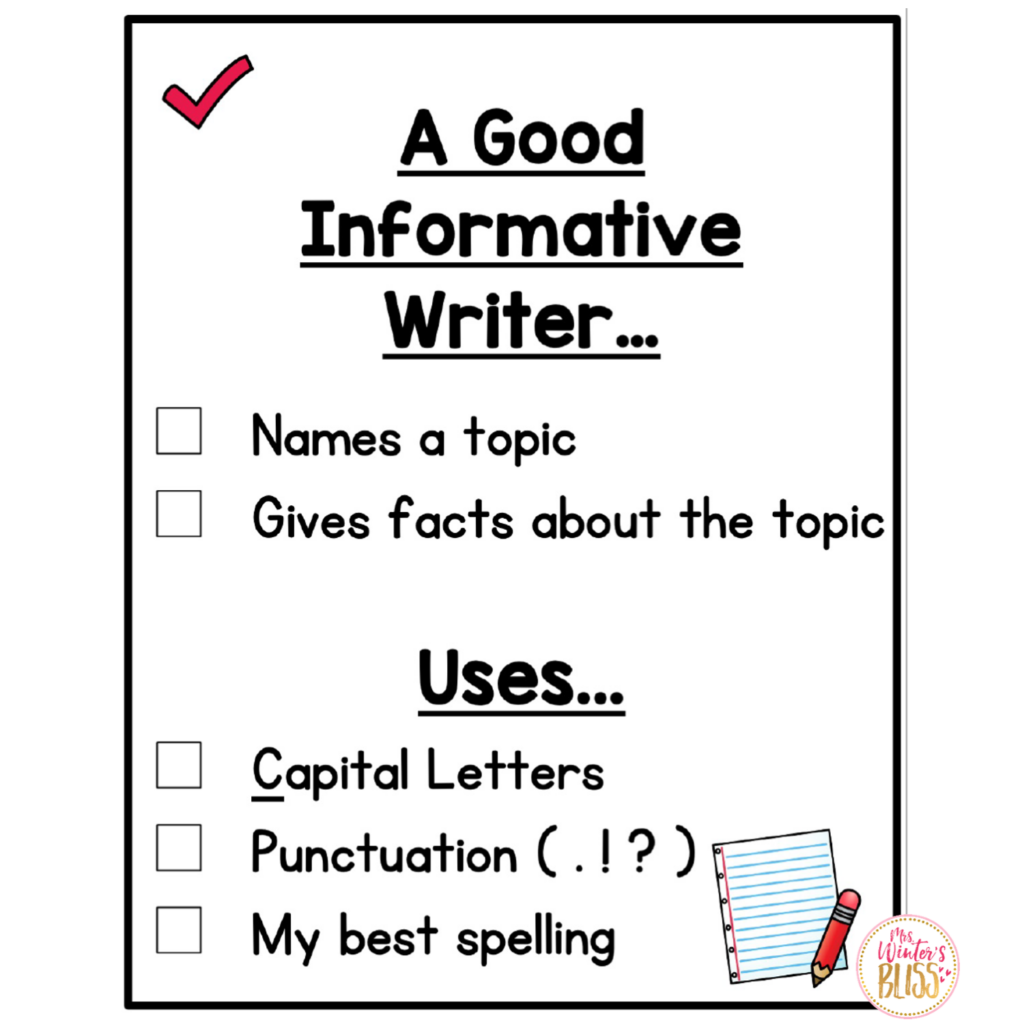
Instead of a seasonal mini-book, the first grade and second grade resource comes with seasonal writing prompts . You’ll get 5 informative writing prompts for each season, so you can practice informative writing all throughout the year.
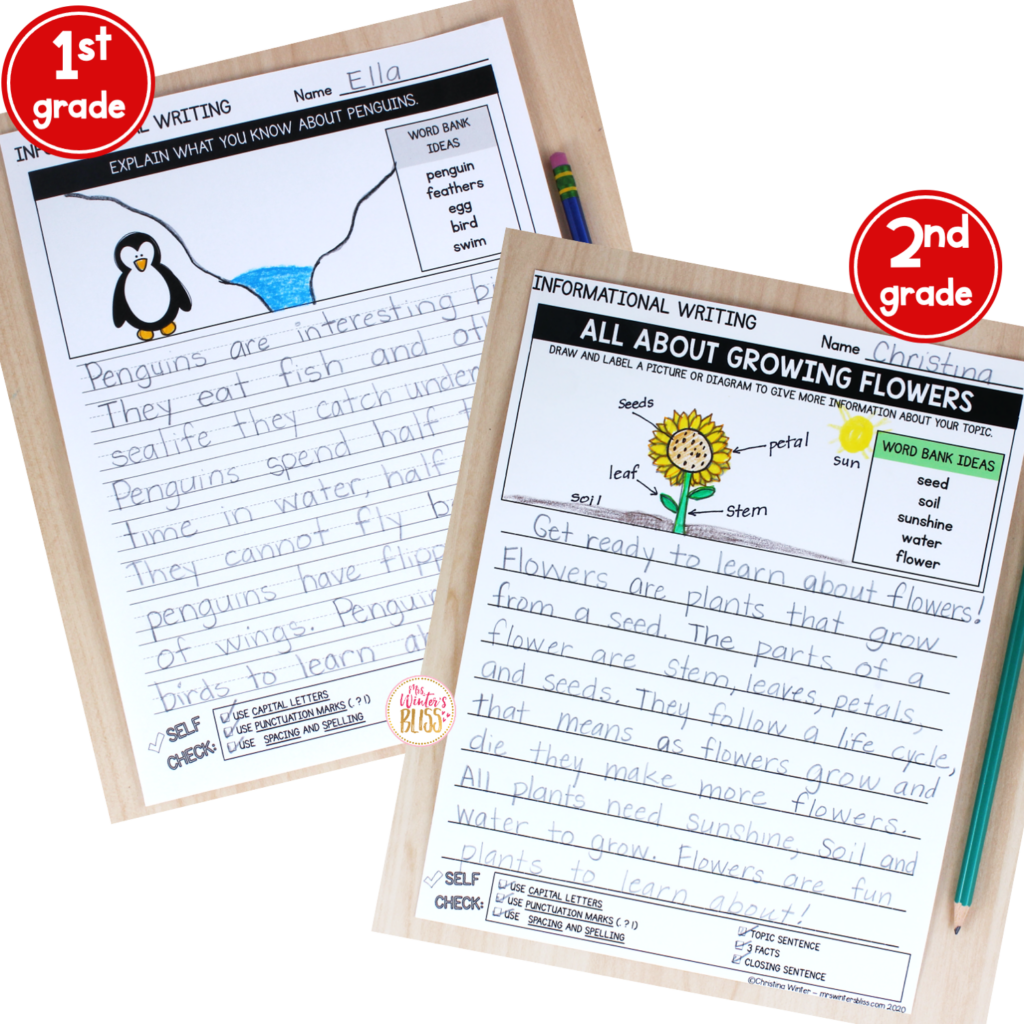
The prompts are both PRINTABLE & DIGITAL. The digital version has been PRELOADED for you, with 1 click add them to your Google Drive or upload them to SeeSaw.
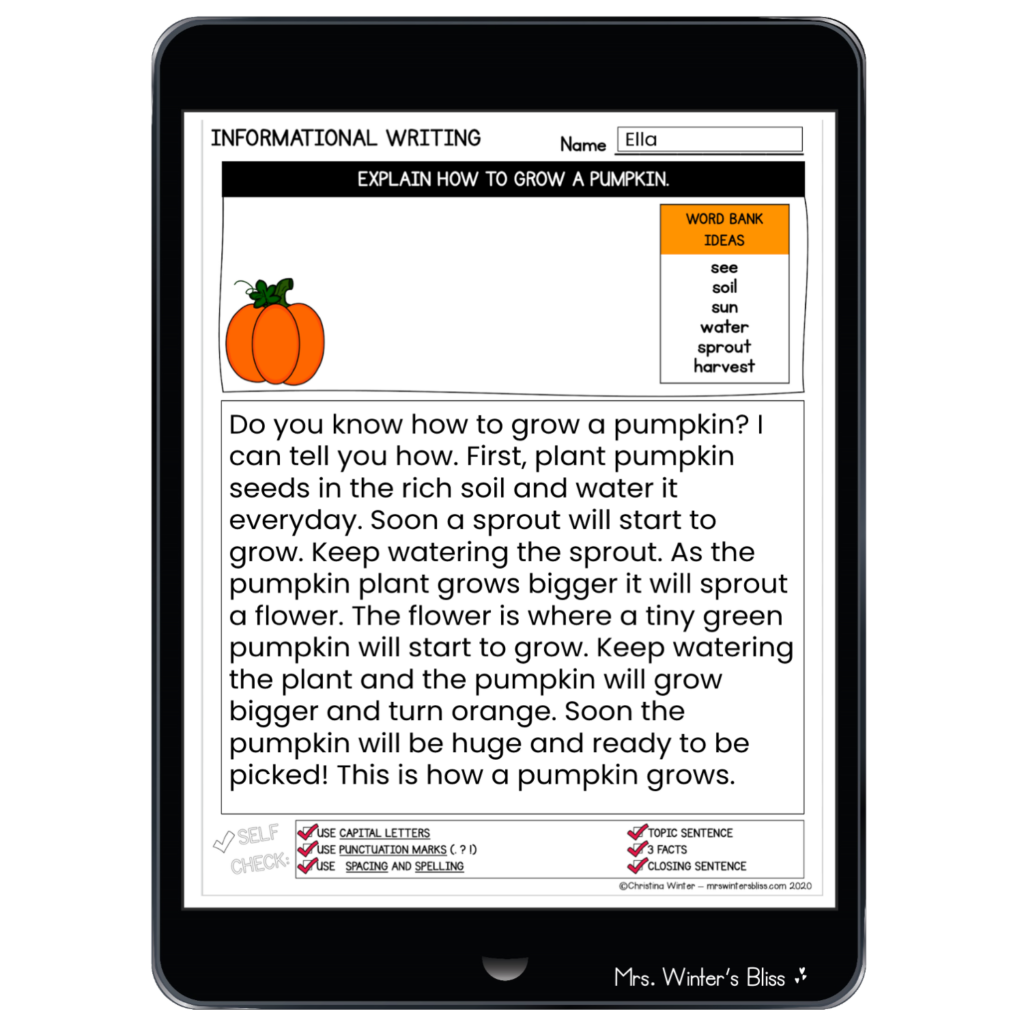
Each seasonal prompt also comes with publishing paper that includes a story specific vocabulary bank to provide spelling support and help students get ideas for what to write about.
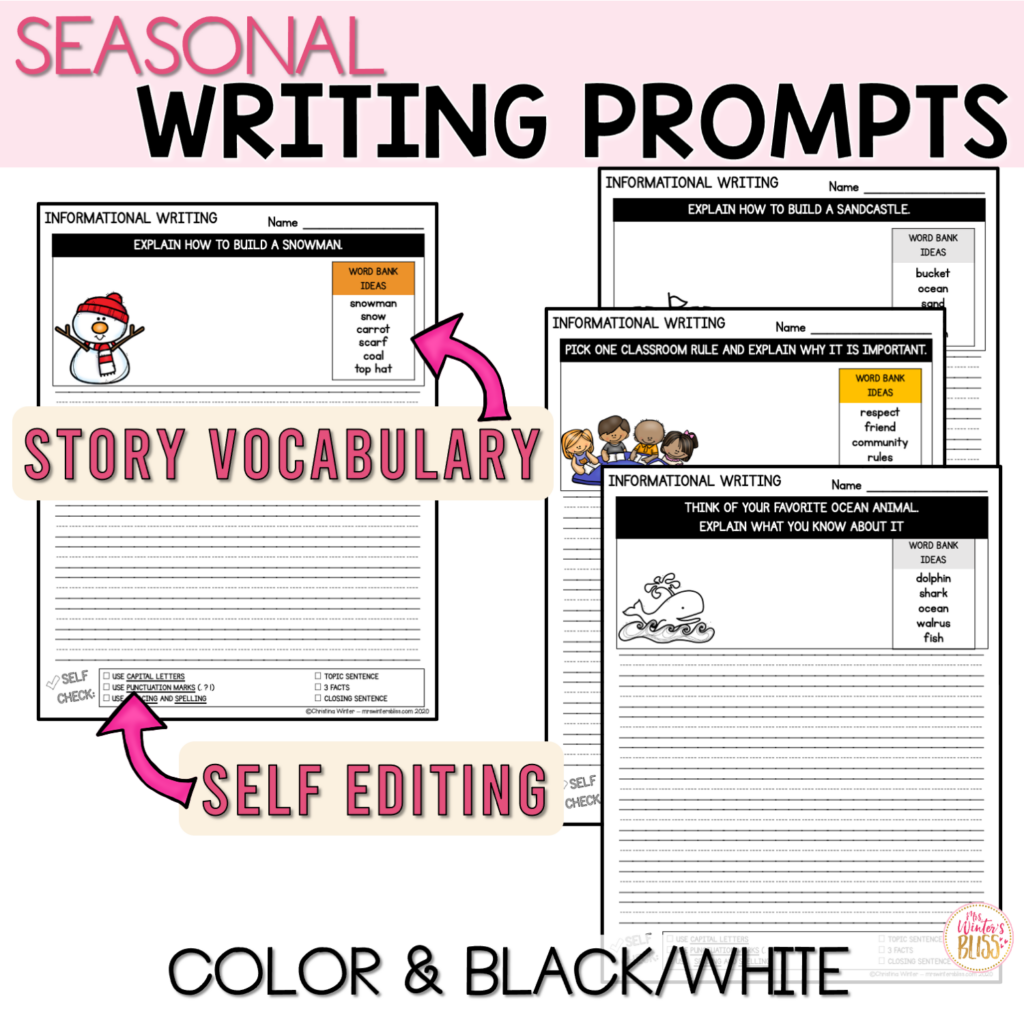
Finally, you’ll also get a self-editing checklist and rubric that have both been made specifically for informative writing. This rubric can be used to help guide students as they work on their pieces, and/or as a self-assessment tool.
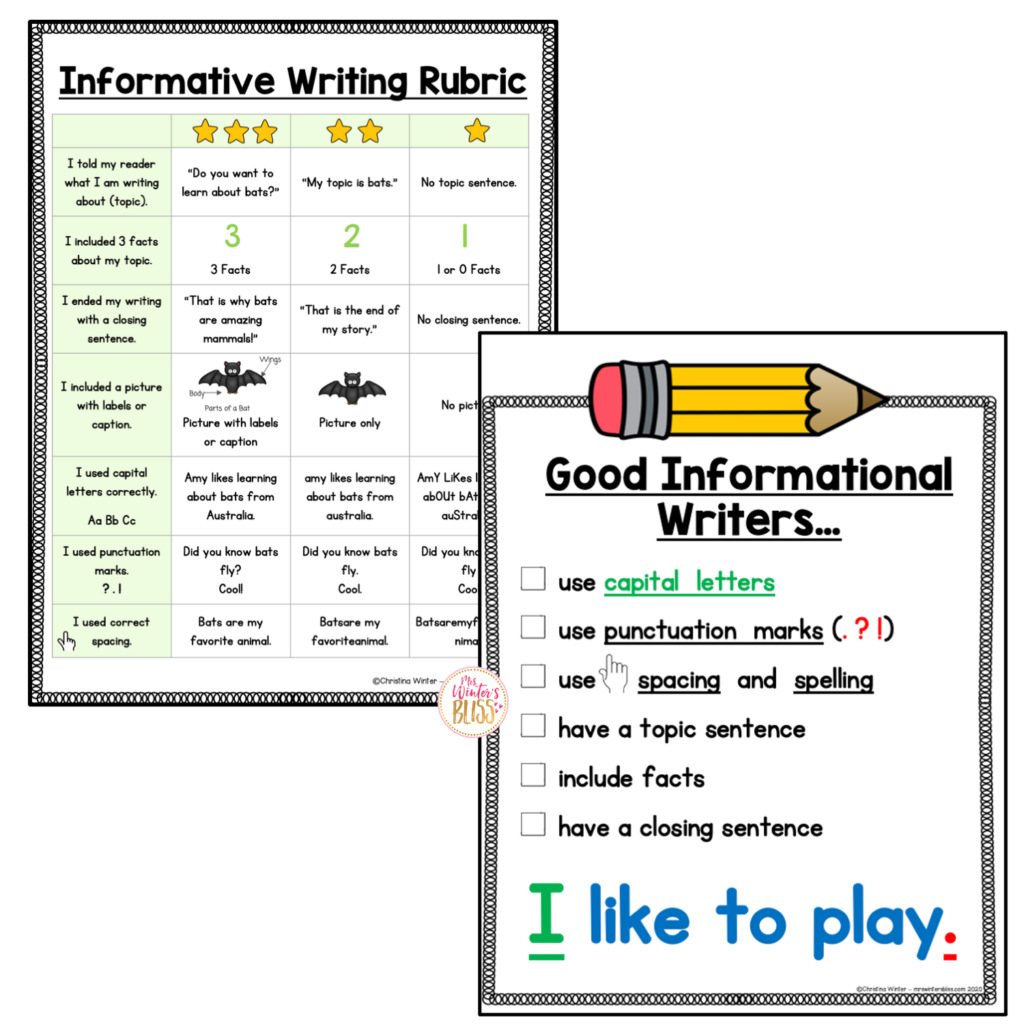
I love these resources because they can be used in so many different ways. They offer opportunities for students to practice informative writing as a whole class, in small groups, as a literacy center activity, for homework, or as a meaningful activity for when you have a substitute teacher! They provide k-2 students with all the practice they need to master informative writing!
FREE Informational Writing Graphic Organizers
Are you ready to begin teaching informative writing in your classroom? To help get your students started, I am happy to offer you 3 FREE informational writing graphic organizers! Download them here!
Helping your students to develop their ability to explain their ideas and share information with others is a valuable academic and life skill they will use well beyond the walls of your classroom. I hope the information and resources I’ve shared today will help to bring stronger informative writing instruction and more meaningful practice to your kindergarten, first and second grade classrooms!
Be on the lookout for my next post that will focus on another genre… Opinion Writing ! I’ll share information and tips for teaching opinion writing, as well as give you details about my Opinion Writing Units for Kindergarten , First and Second grade students!
-shop this post-
– PIN for LATER –

FIND WHAT YOU NEED
Teaching resources.

BLISS IN YOUR INBOX
COPYRIGHT © 2024 · TERMS AND CONDITIONS
Purdue Online Writing Lab Purdue OWL® College of Liberal Arts
Welcome to the Purdue Online Writing Lab

Welcome to the Purdue OWL
This page is brought to you by the OWL at Purdue University. When printing this page, you must include the entire legal notice.
Copyright ©1995-2018 by The Writing Lab & The OWL at Purdue and Purdue University. All rights reserved. This material may not be published, reproduced, broadcast, rewritten, or redistributed without permission. Use of this site constitutes acceptance of our terms and conditions of fair use.
The Online Writing Lab at Purdue University houses writing resources and instructional material, and we provide these as a free service of the Writing Lab at Purdue. Students, members of the community, and users worldwide will find information to assist with many writing projects. Teachers and trainers may use this material for in-class and out-of-class instruction.
The Purdue On-Campus Writing Lab and Purdue Online Writing Lab assist clients in their development as writers—no matter what their skill level—with on-campus consultations, online participation, and community engagement. The Purdue Writing Lab serves the Purdue, West Lafayette, campus and coordinates with local literacy initiatives. The Purdue OWL offers global support through online reference materials and services.
A Message From the Assistant Director of Content Development
The Purdue OWL® is committed to supporting students, instructors, and writers by offering a wide range of resources that are developed and revised with them in mind. To do this, the OWL team is always exploring possibilties for a better design, allowing accessibility and user experience to guide our process. As the OWL undergoes some changes, we welcome your feedback and suggestions by email at any time.
Please don't hesitate to contact us via our contact page if you have any questions or comments.
All the best,
Social Media
Facebook twitter.

IMAGES
VIDEO
COMMENTS
Describe the duties connected with your classroom job. 6. Write a short biography about a significant person in history. 7. Explain how to play tetherball. 8. Talk about a day in the life of a teacher. 9. Write about the different bodies of water that exist in the world.
According to the Common Core State Standards Initiative, fourth-grade writing should include opinion pieces, informative or explanatory texts, and narratives about real or imagined experiences. Additionally, a fourth-grade writing curriculum should include short research projects. These writing prompts offer diverse forms of inspiration for ...
Oct 6, 2023. Fourth grade is a time for students to continue to hone their writing chops as they put to use the skills they've learned and gain confidence in their abilities. We've collected this list of fourth grade writing prompts—including opinion, persuasive, informational, and narrative—to spur your students' imaginations and get ...
Hopefully your fourth graders found inspiration in these Expository Writing Prompts 4th Grade. Now, check out this list more writing prompts and warm ups for fourth graders. 151 More Prompts for 4th Graders. 69 Great Writing Prompts for 4th Grade; 33 Expository Writing Prompts for First, Second, and Third Graders; 35 Essay Topics for Kids
I hope you enjoyed these informational writing prompts and use them to help your writers — in fourth grade, 5th grade, and up — explore the writing process and improve their writing skills! 199 More Writing Topics for Kids. 35 Awesome Kids Essay Topics; 21 Explanatory Essay Topics for Students; 36 Opinion Writing Prompts for Students
Reduce screen time: Offer an alternative to passive entertainment and encourage creative expression. 50 Exclusive 4th Grade Writing Prompts. Writing helps stimulate and organize thoughts in 4th-grade children. They make them better off expressing whatever they have in their mind and feel a little less burdensome.
Writing informative paragraphs. Using a graphic organizer, students plan out an informative piece. Writing informative essays. These worksheets outline the structure for writing informative essays on various topics. Compare and contrast worksheets. Students write essays by comparing and contrasting two things in these worksheets. Research writing
A: To make informational writing prompts more engaging for 4th-grade students, consider incorporating real-life scenarios or examples that relate to their interests or experiences. Use visuals, such as photographs or diagrams, to support their understanding of the topic.
Essay writing. Students are given a prompt to write an informative essay; one topic per worksheet. Informative writing prompts. Transportation. Peer pressure. Change. Childhood. Patience. Role models.
Writing prompts for 4th grade are valuable tools to ingnite creativity & inspire self-reflection. Spark their imagination with these 4th grade writing prompts! ... 10 Informative Essay Writing Prompts. The essence of Informative Writing prompts lies in how well students can convey particulars about an object, a personality, or an event to the ...
Informative writing can include how-to process essays, biographical writing, an in-depth analysis of a topic, research papers, or compare-and-contrast essays. Just remember to stick to the facts, and be clear and descriptive. These informative essay topics offer something for all interests and ages. Jump to: How-To Informative Essay Topics
The writing prompts for 4th-grade students listed below are full of interesting and creative questions designed to help your students think more about who they are and what unique qualities define their identities. In these new prompts, students will consider everything from the act of giving to differences between boys and girls to their ...
The plan and example essay includes 2-3 body paragraphs. So your students will be writing 4 - 5 paragraph essays. Depending on which you prefer to have your students write, you'll just add/remove a body paragraph. Paragraph 1: Introduction. Paragraph 2: Body Paragraph 1.
Download 4th Grade Expository Student Sample and Lesson Procedures. First name*. Last name*. School/District*. State or School Region*. Here is a 4th grade student sample after Empowering Writers instruction along with teacher commentary on the informational writing skills the student used.
Worksheet. Informational Outlines 1. Worksheet. Argument Writing: Peer Review Rubric. Worksheet. Respond to Art: Opinion & Evidence #2. Worksheet. 1 2. Our fourth grade essay writing worksheets will help students write their own tickets for success with different text types.
An informational essay is a type of writing that aims to inform the reader about a particular topic. These essays typically provide factual information about a subject, and they may be written in a formal or informal style. ... Prompts for 4th Grade. By fourth grade, students should be able to write longer, more detailed pieces of informational ...
Grade 4: ACT ASPIRE Expository Writing Prompts ©2016 Aulundria Grace, Curriculum Coach You are going to write an essay to explain the qualities of a good movie. Think about your favorite movie. Think about the qualities that make it a good movie.
Doing so will help them refine their writing skills and help give them a boost when they have to write more elaborate essays later on in life (such as I in middle school, high school, college and beyond). Links & Resources. 30 Expository Writing Prompts for 4th Grade; Explanatory Writing: 22 Writing Prompt Ideas for Students
Informational Outlines 1. Worksheet. Informational Outlines 3. Worksheet. Personal Stories in Informational Writing. Worksheet. 1. Browse Printable 4th Grade Informative Essay Structure Worksheets. Award winning educational materials designed to help kids succeed.
An informative essay is a staple in middle school ELA and high school English classrooms. An informative essay is a type of writing meant to inform the reader about a specific topic. Informative essays are based on facts and evidence and are not meant to persuade or argue a particular point of view. Read on to read 25 informative essay writing prompts!
These worksheets introduce students to informative writing, including research, note taking, recording sources and writing essays. Writing Introductions: Write hooks and topic sentences. Supporting Details: Write details supporting the main ideas. Writing informative paragraphs: Incorporate facts and examples into the text.
It is one of the most common types of writing we use in our everyday lives. Today I'm excited to share 5 tips for teaching informational writing, as well as a valuable resource that has everything you need to teach informative writing to your kindergarten, first grade, or second grade students! 1. Read Informative Writing Mentor Texts.
Mission. The Purdue On-Campus Writing Lab and Purdue Online Writing Lab assist clients in their development as writers—no matter what their skill level—with on-campus consultations, online participation, and community engagement. The Purdue Writing Lab serves the Purdue, West Lafayette, campus and coordinates with local literacy initiatives.